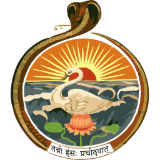Minutes of the Youth Cell
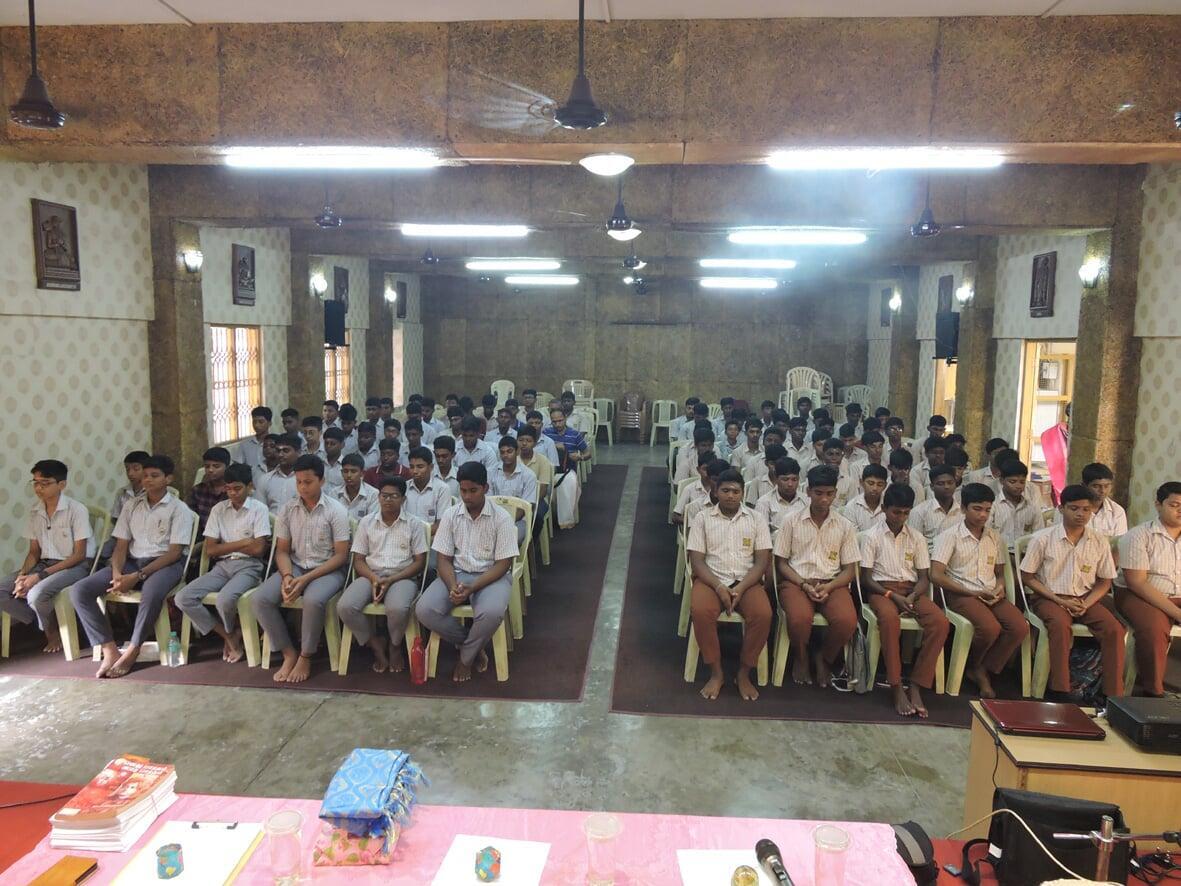
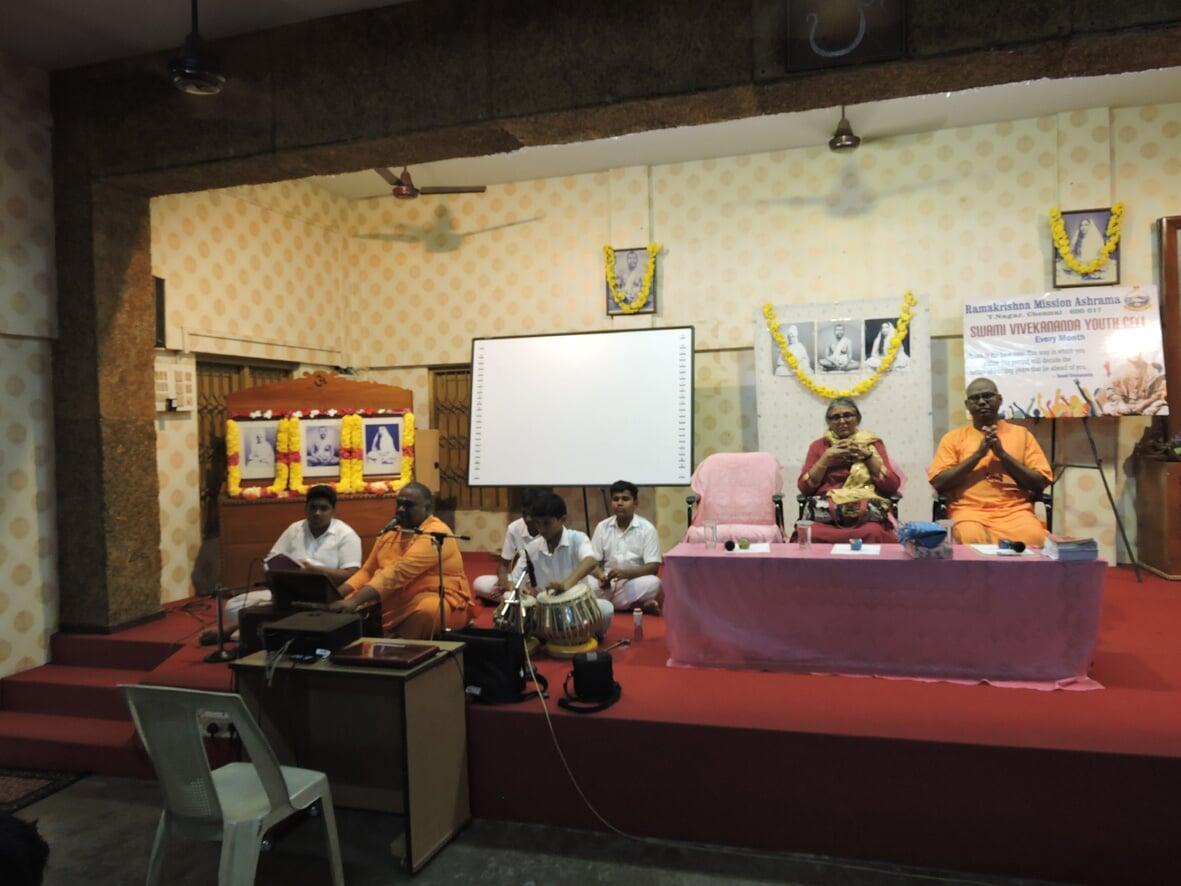
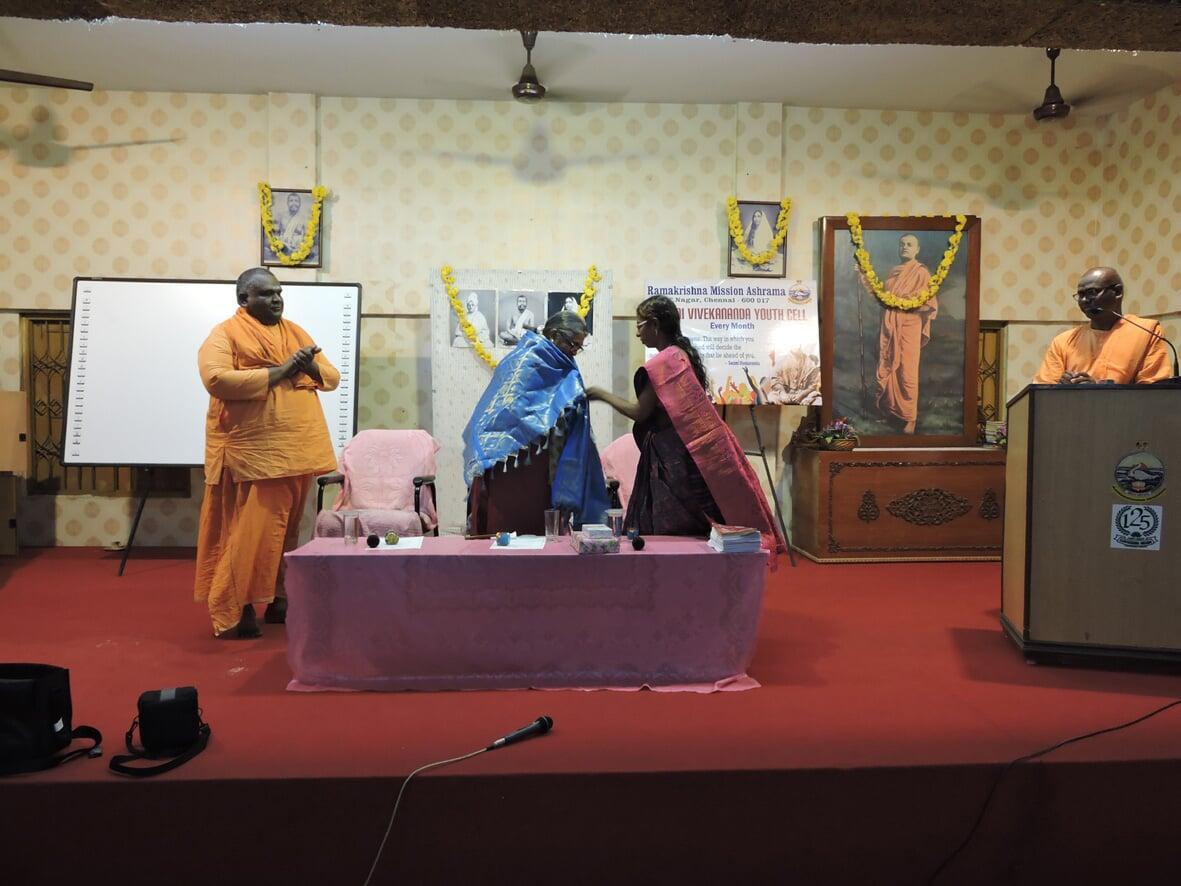
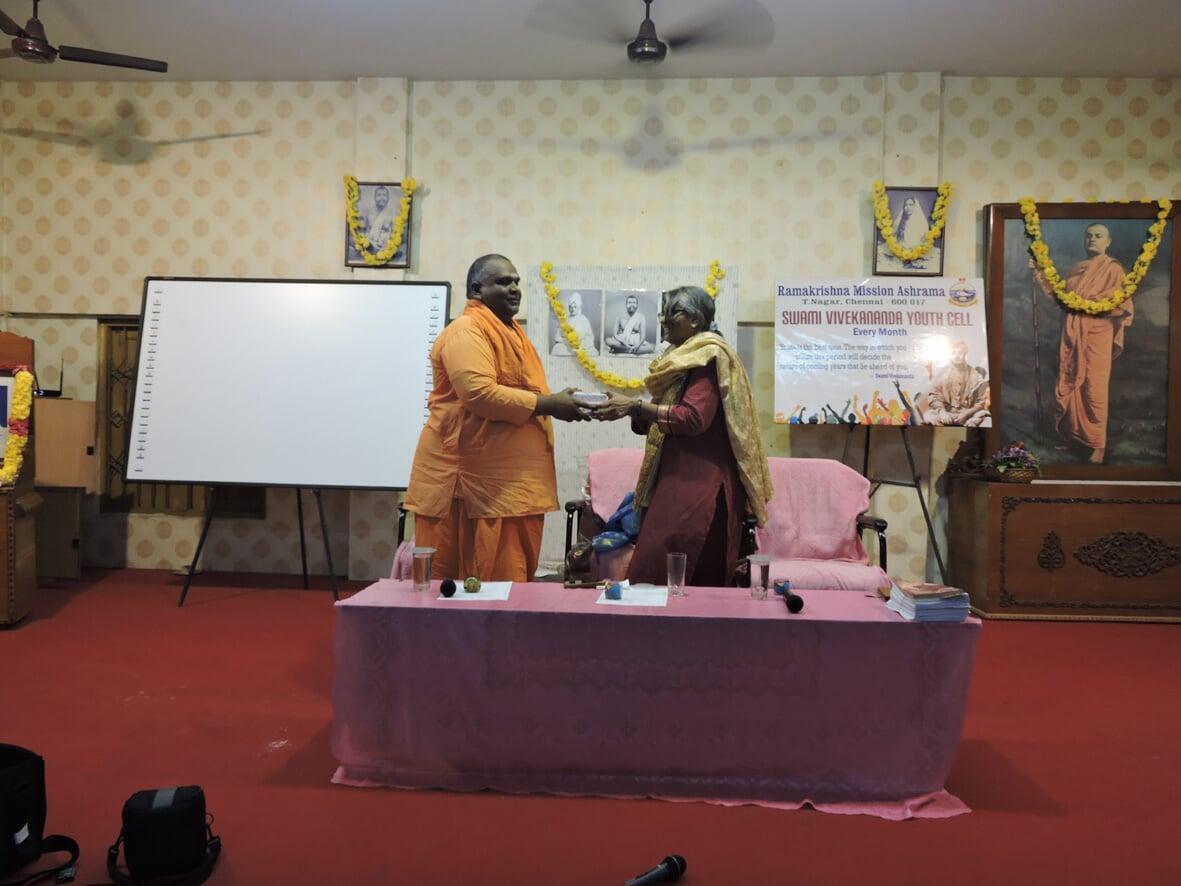
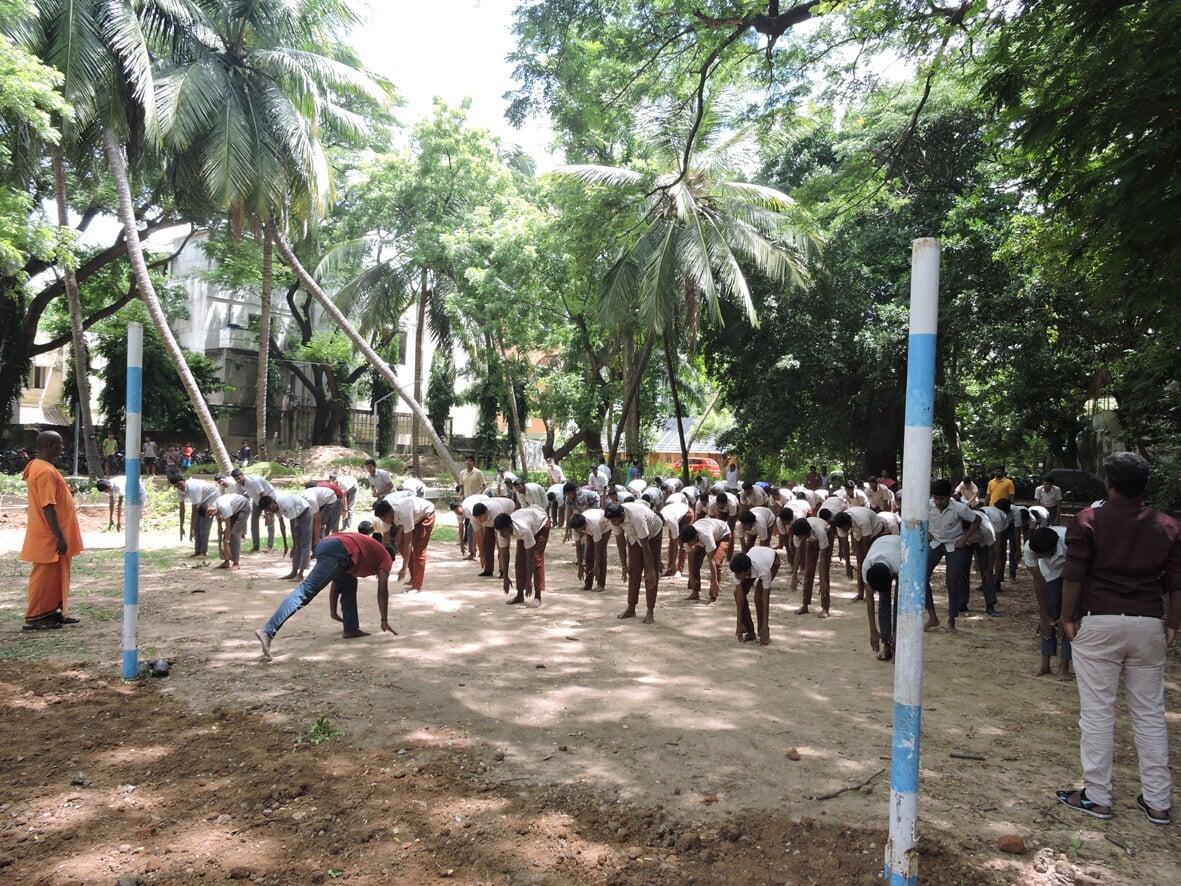
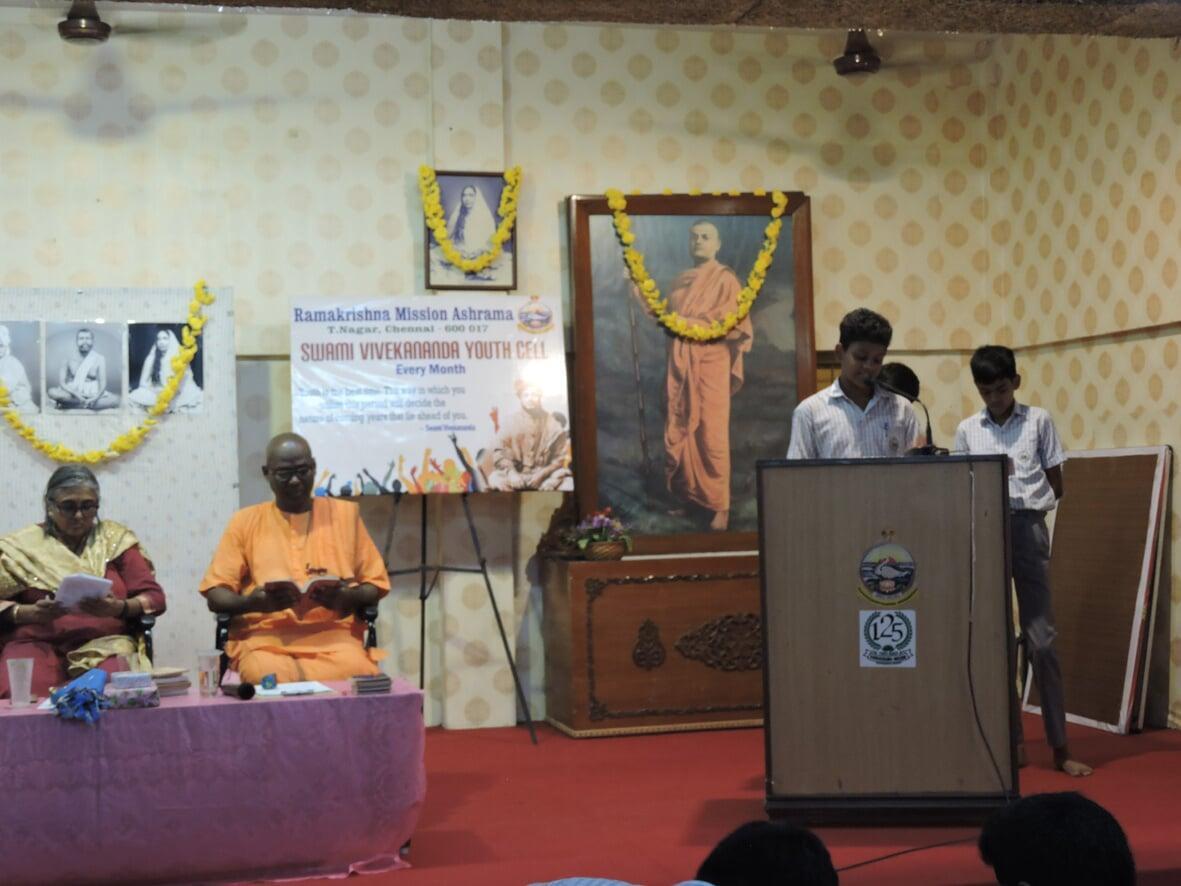
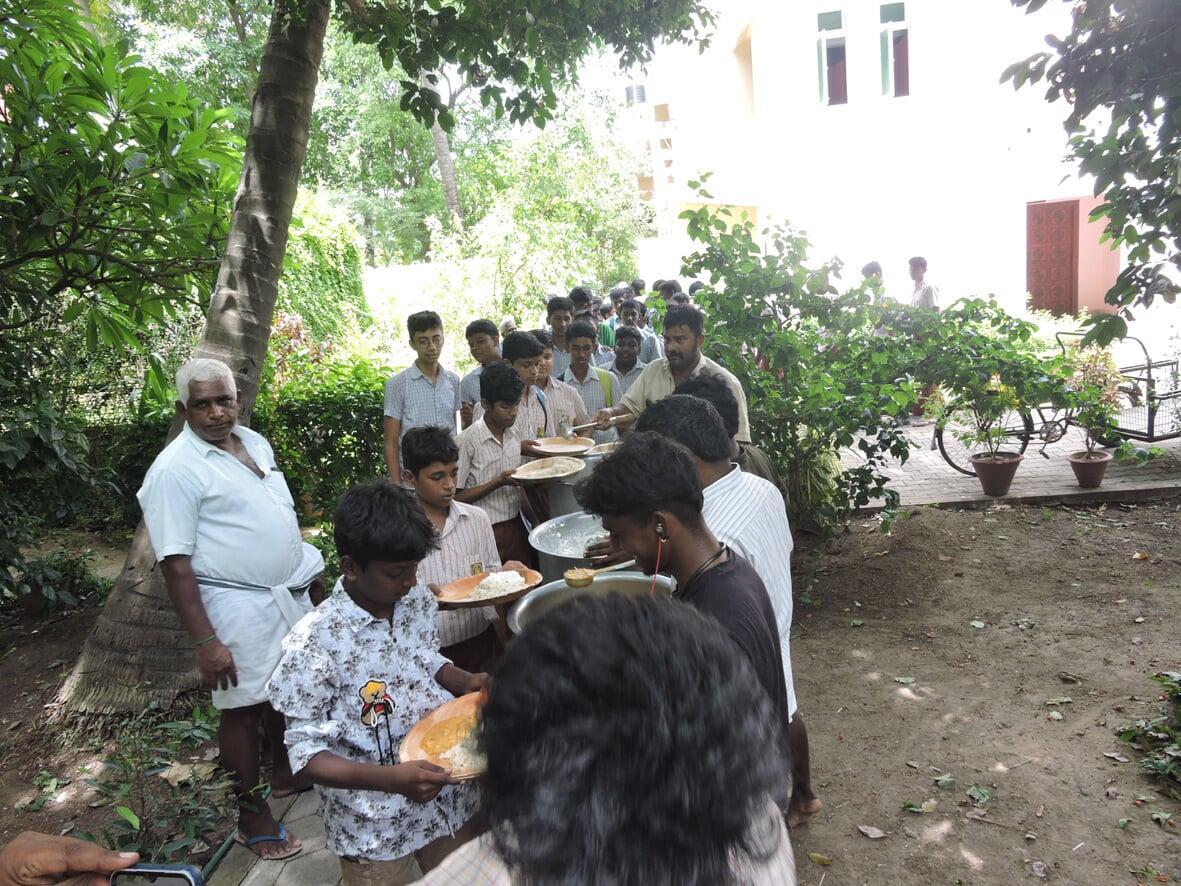
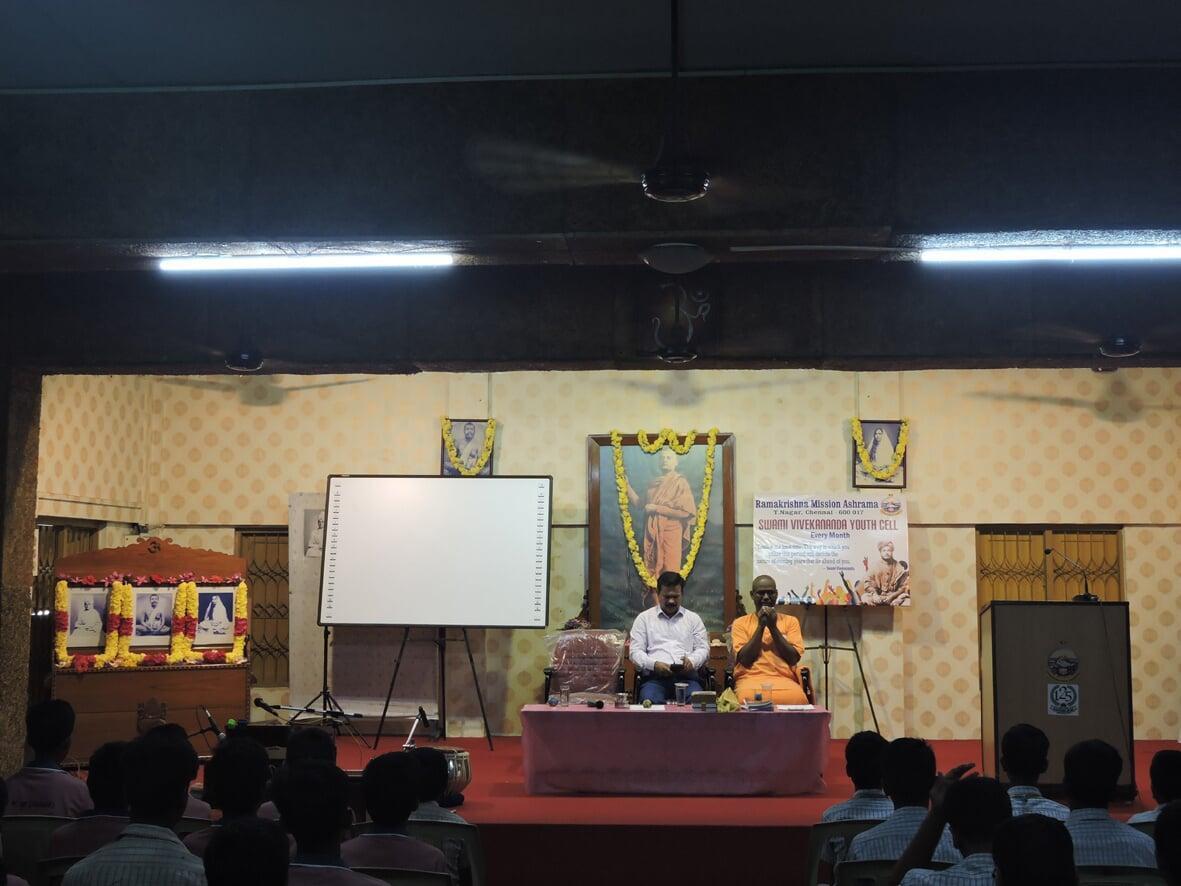
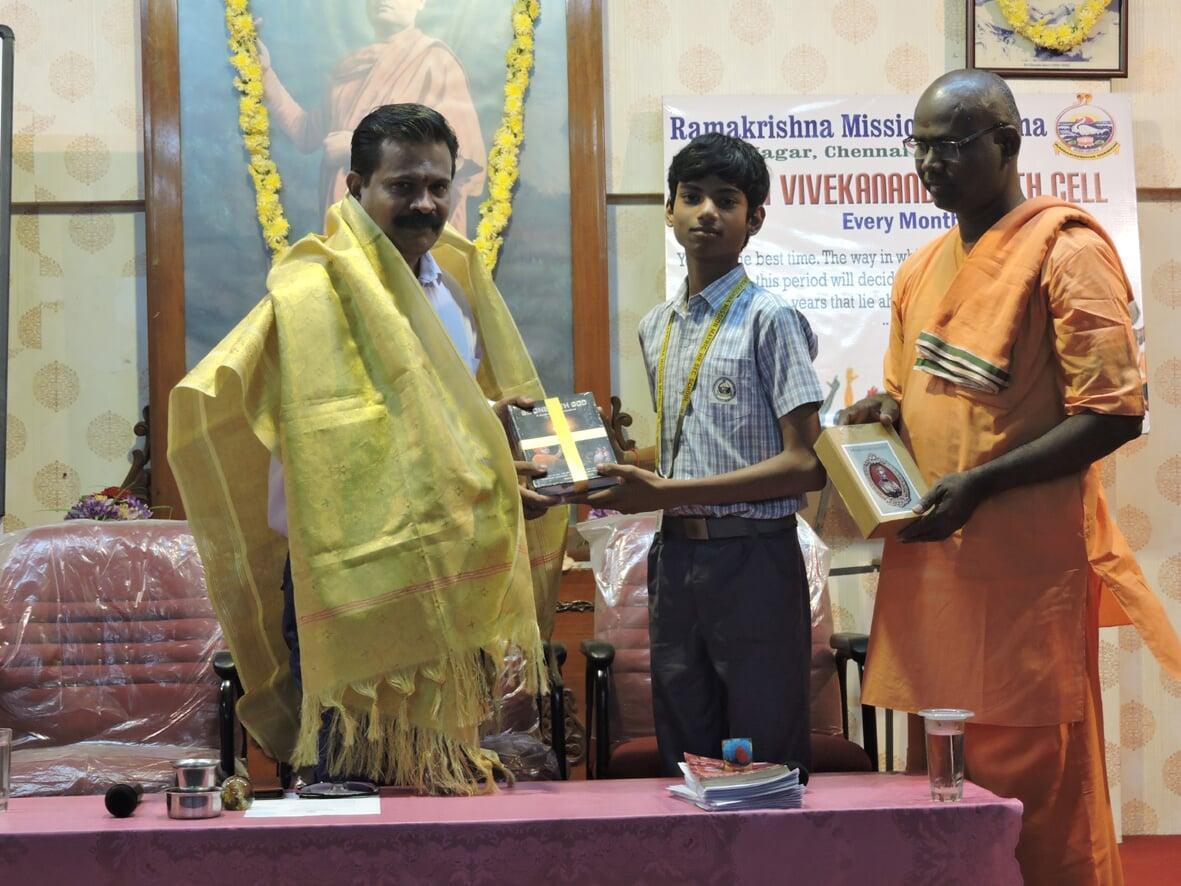
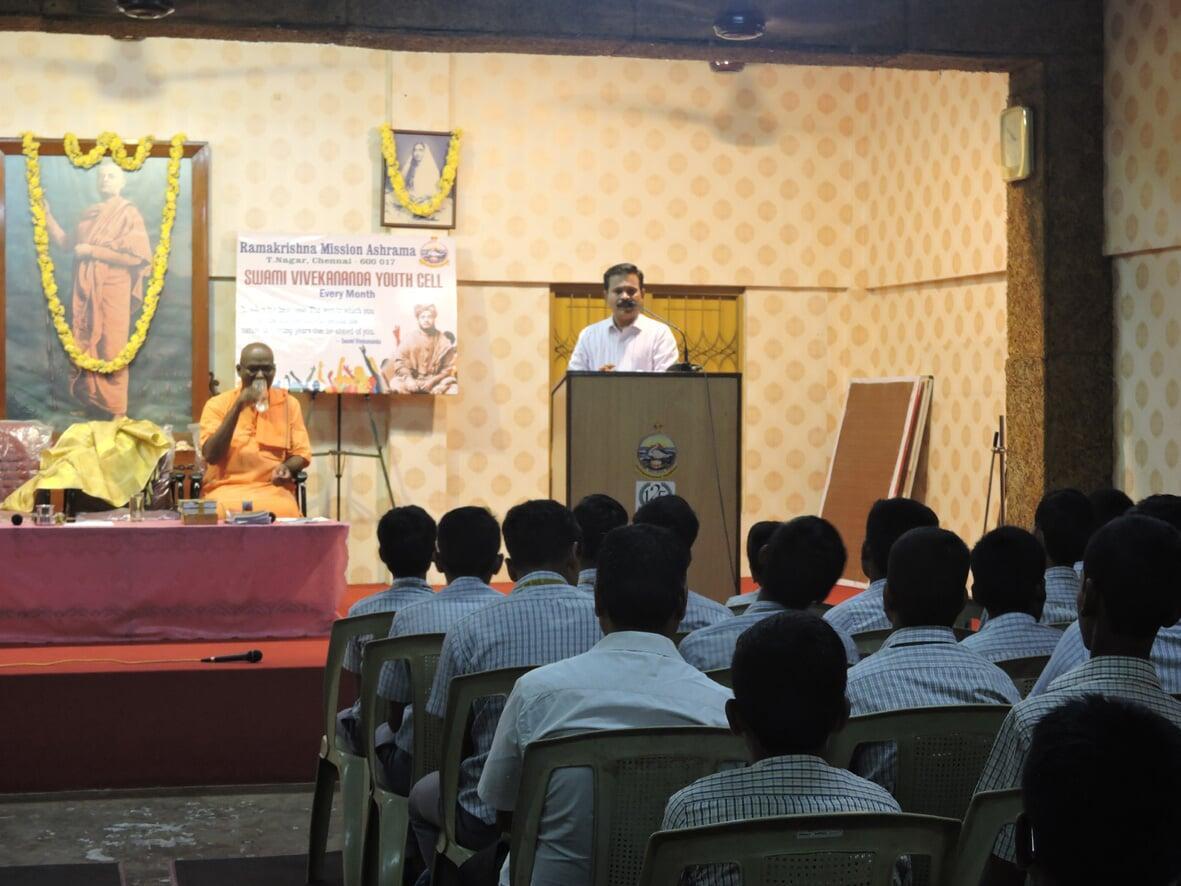
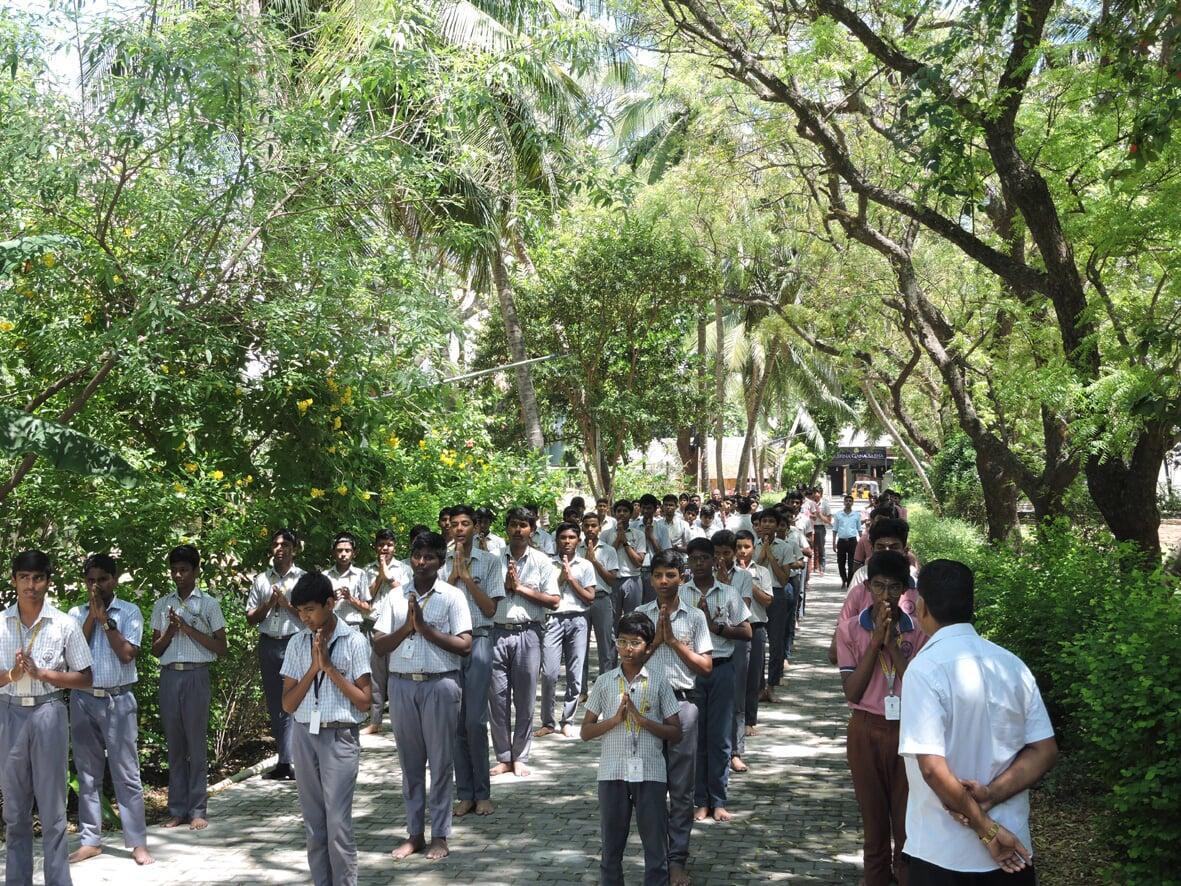
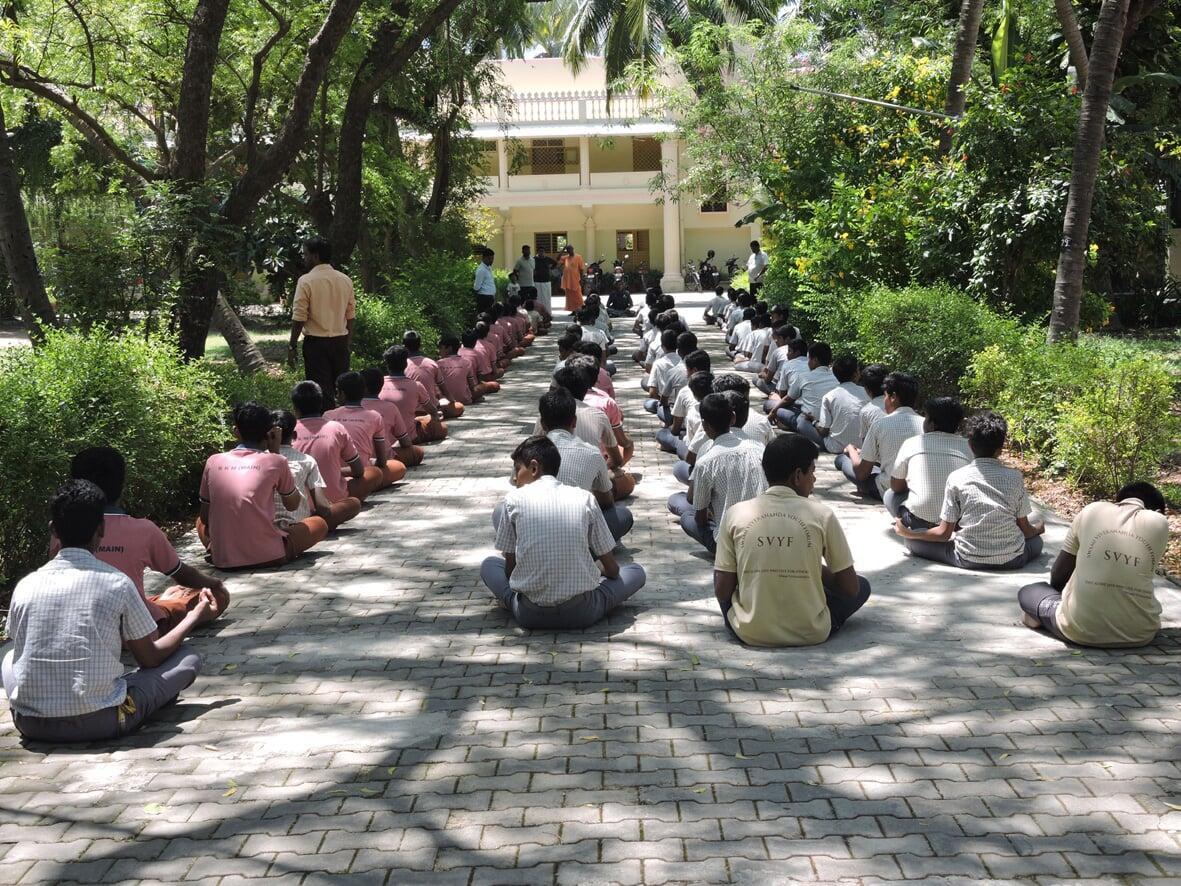
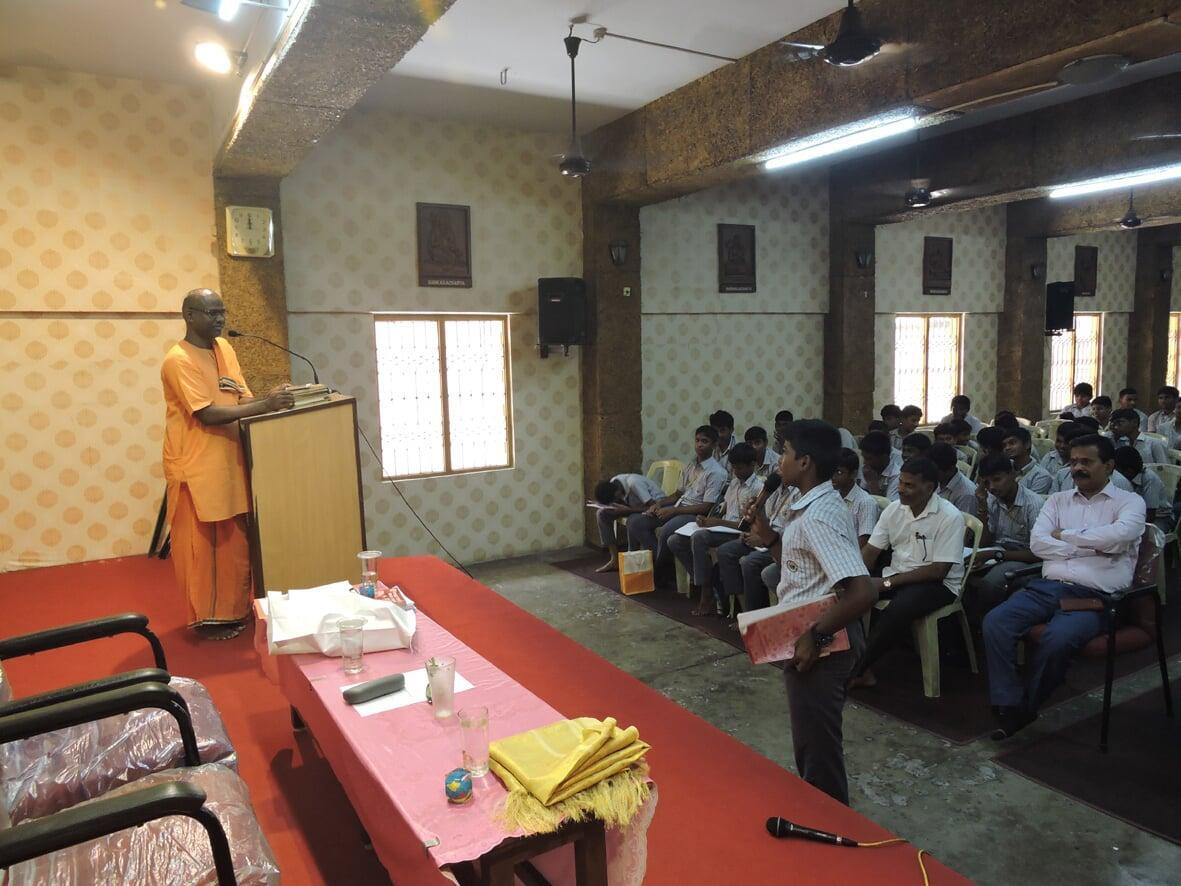
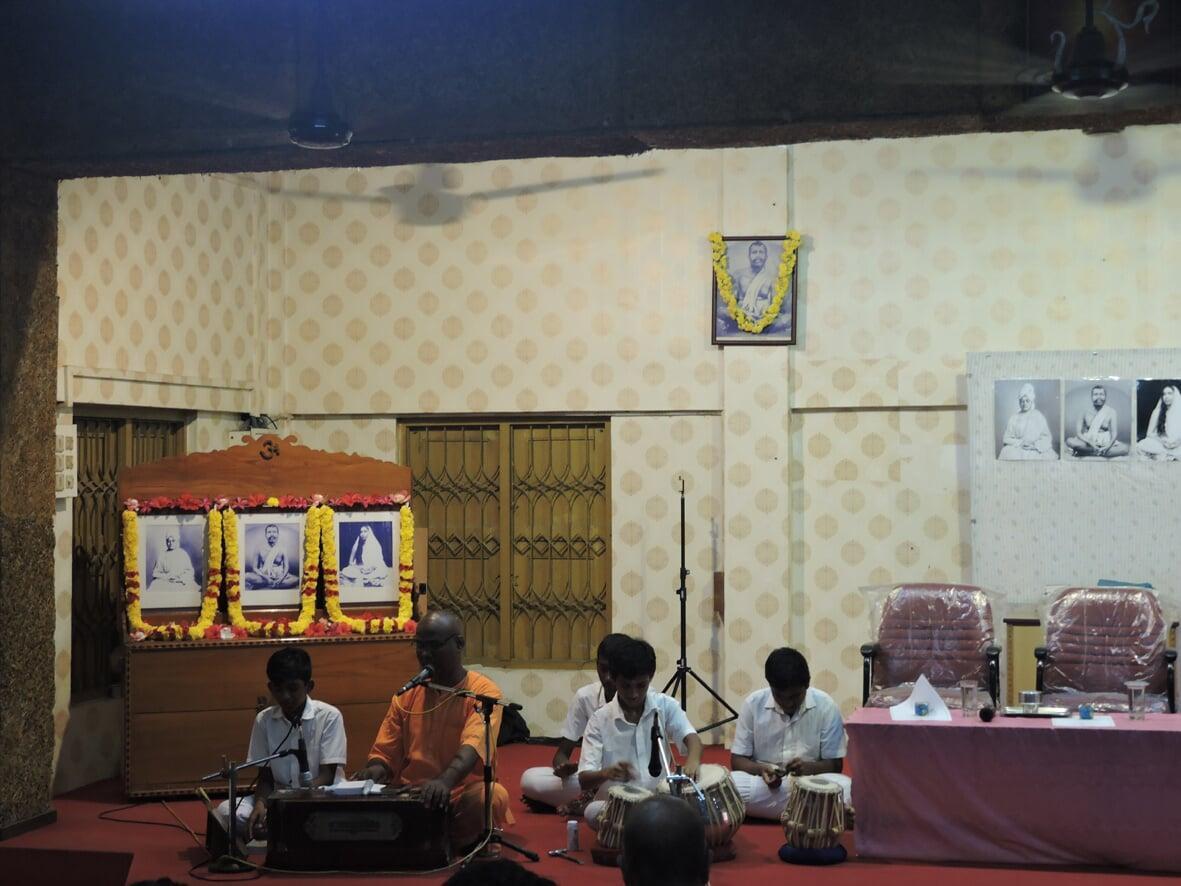
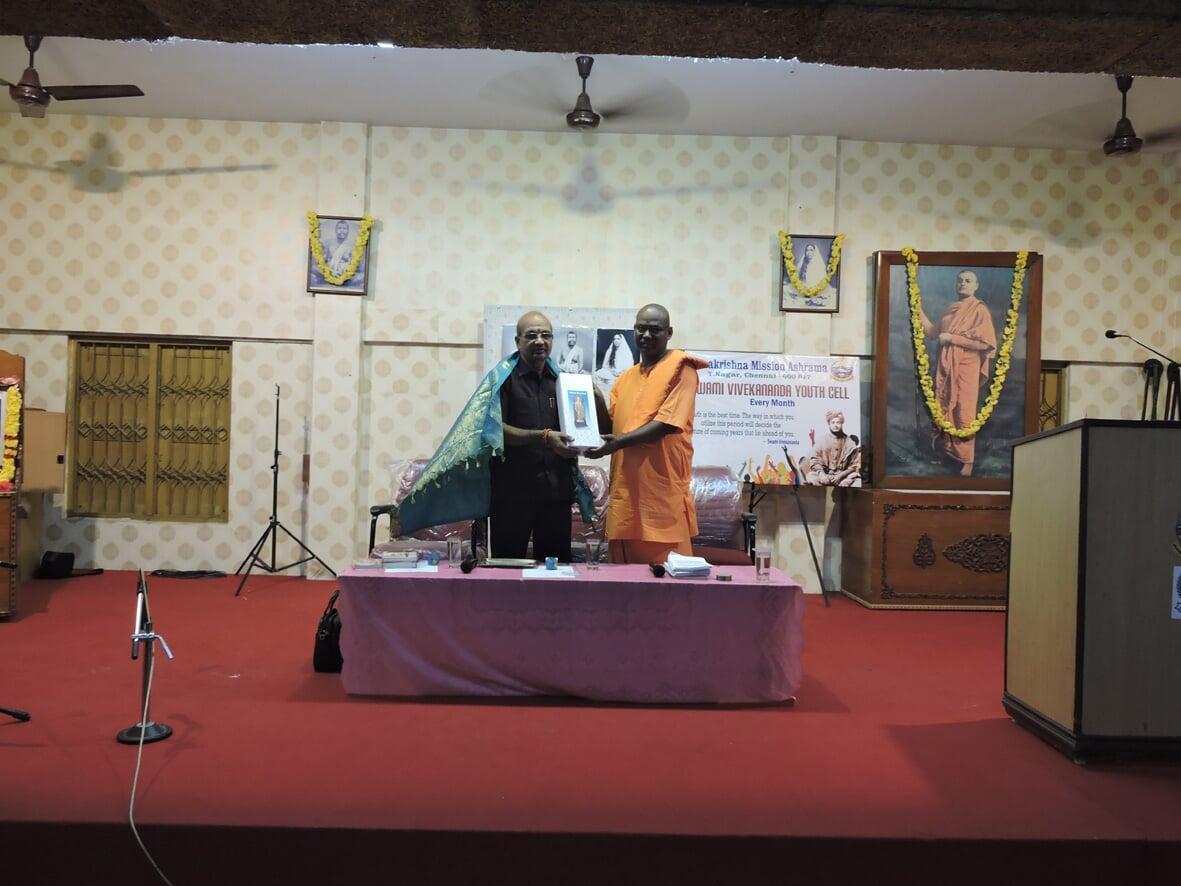
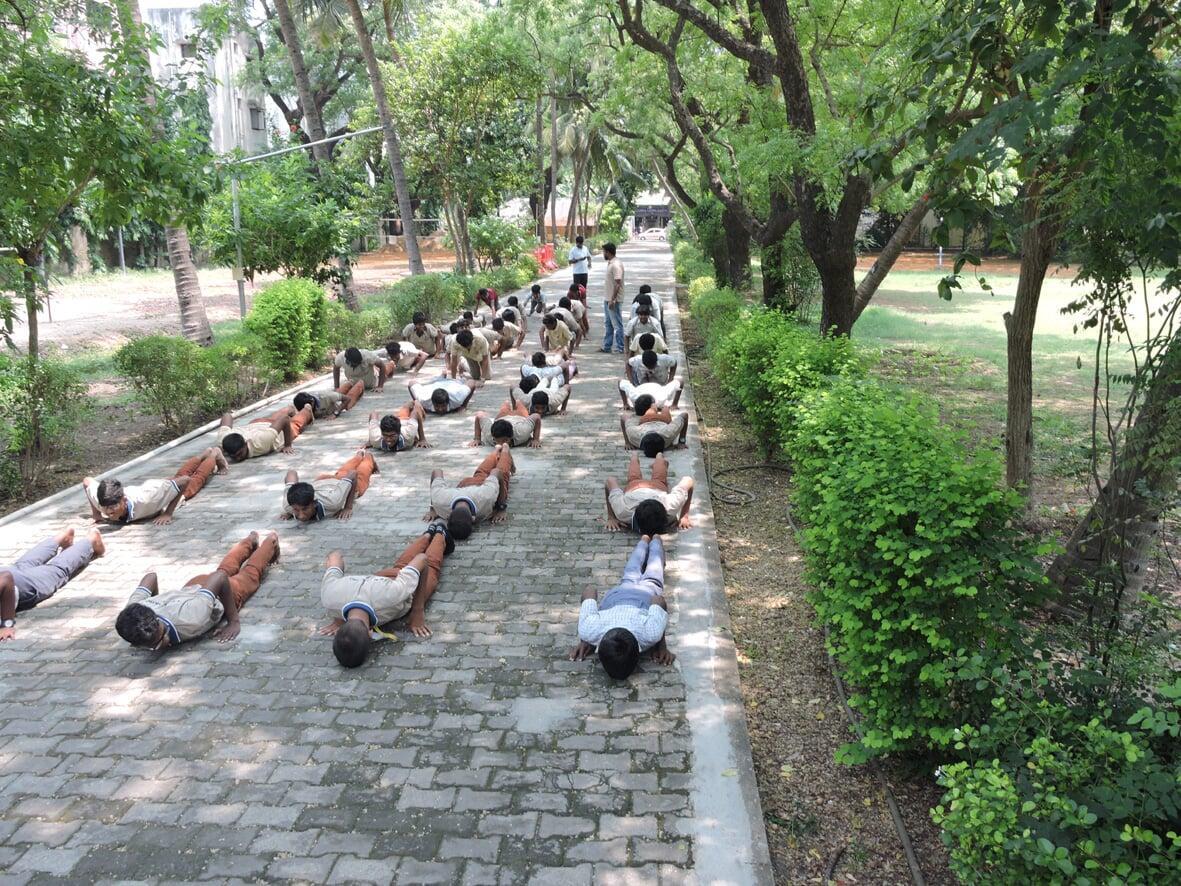
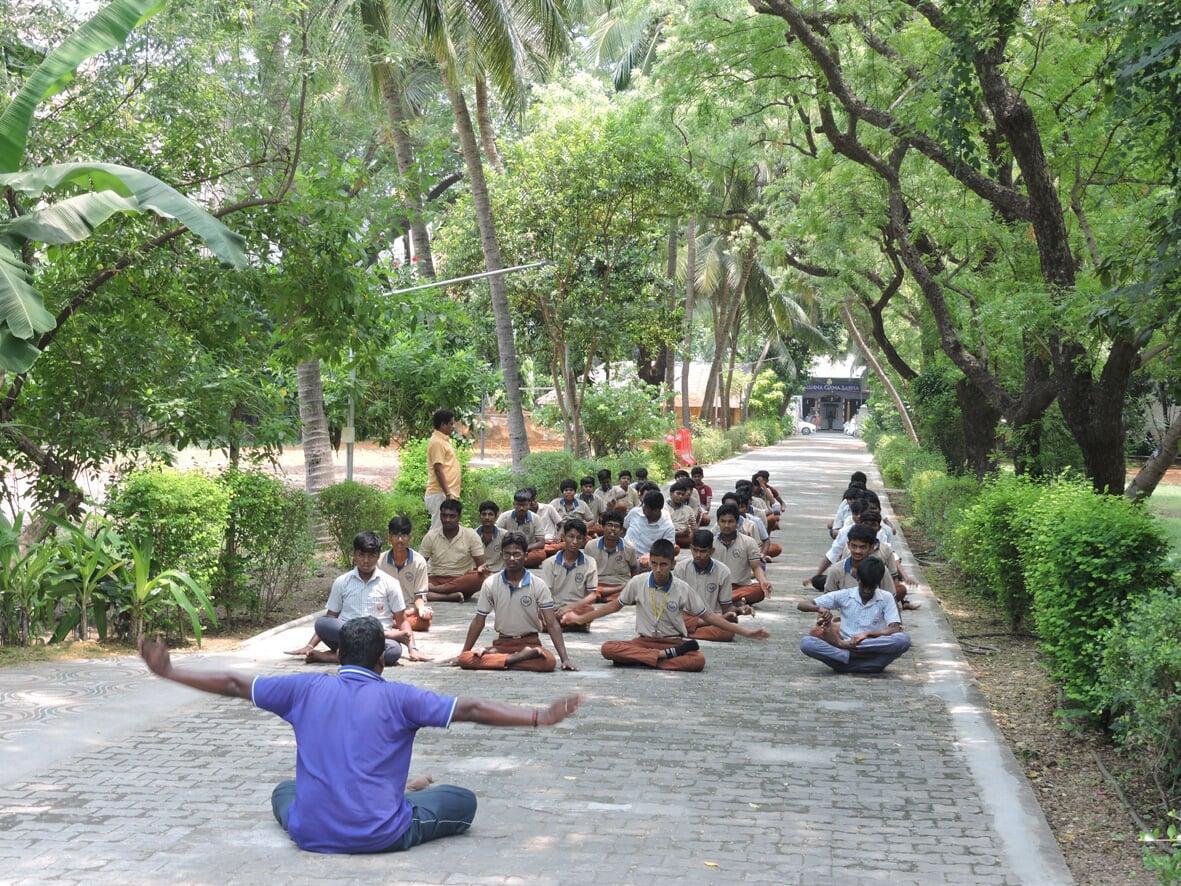
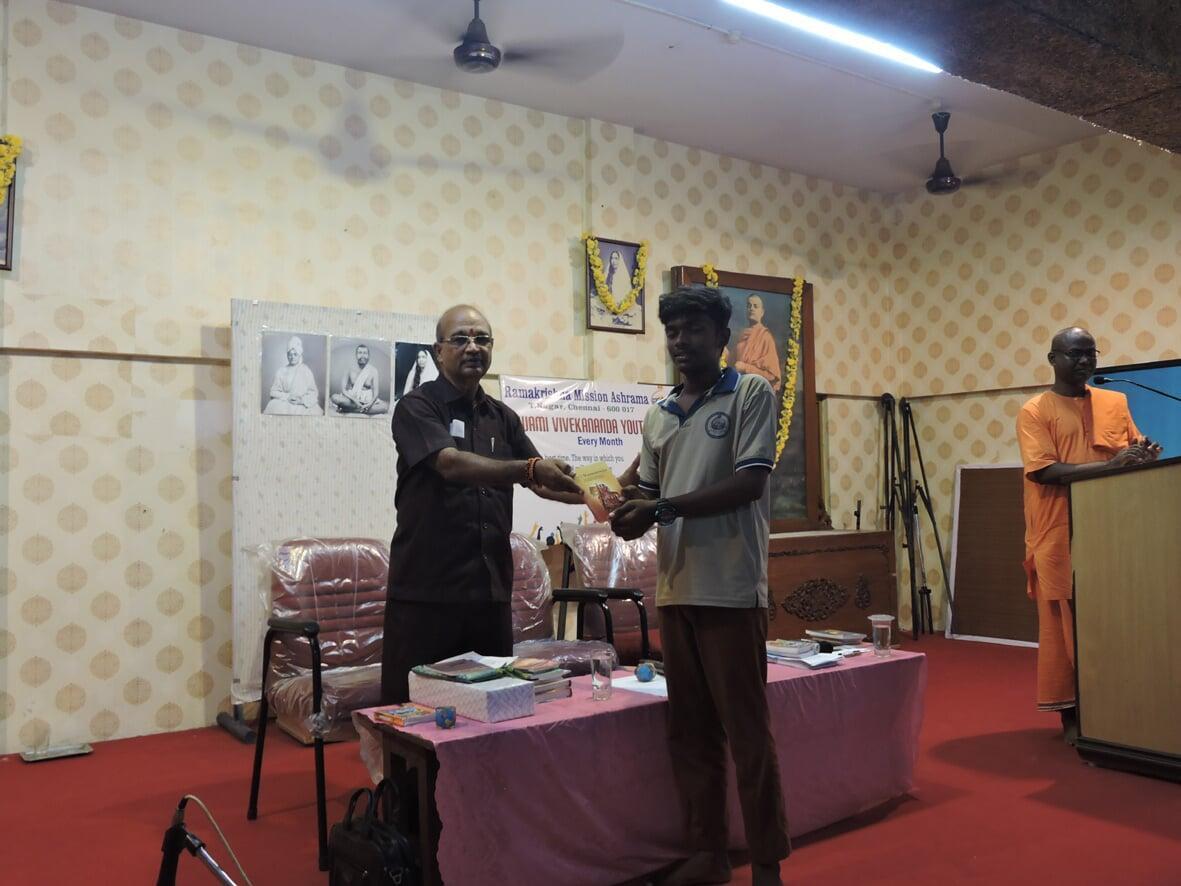
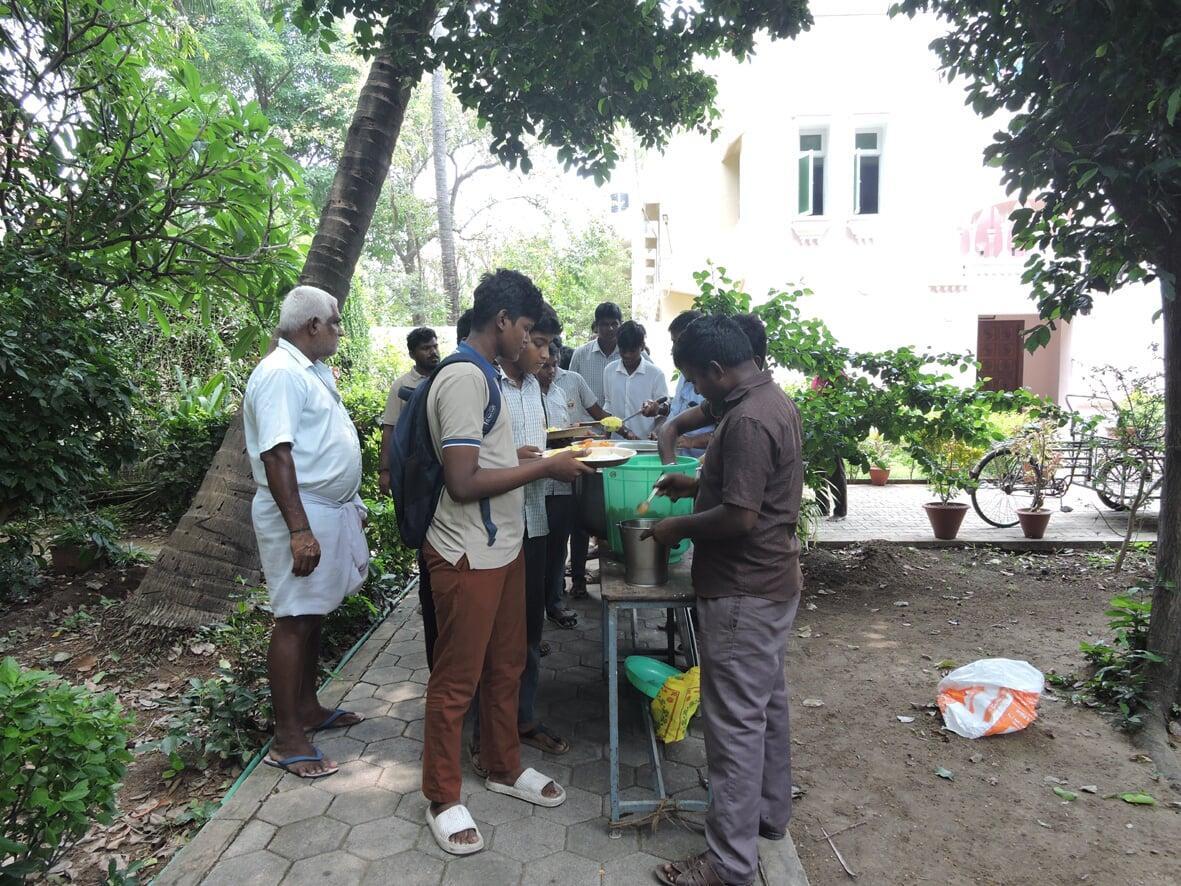
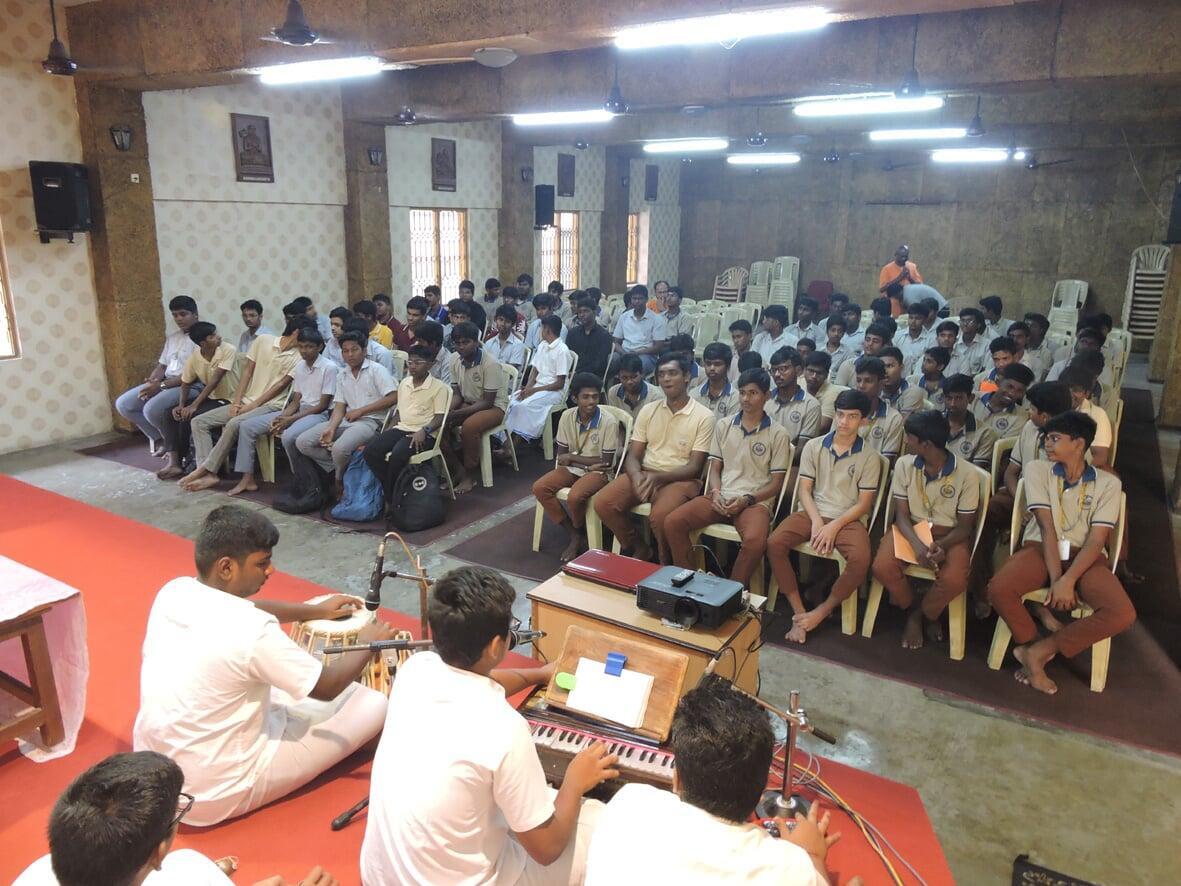
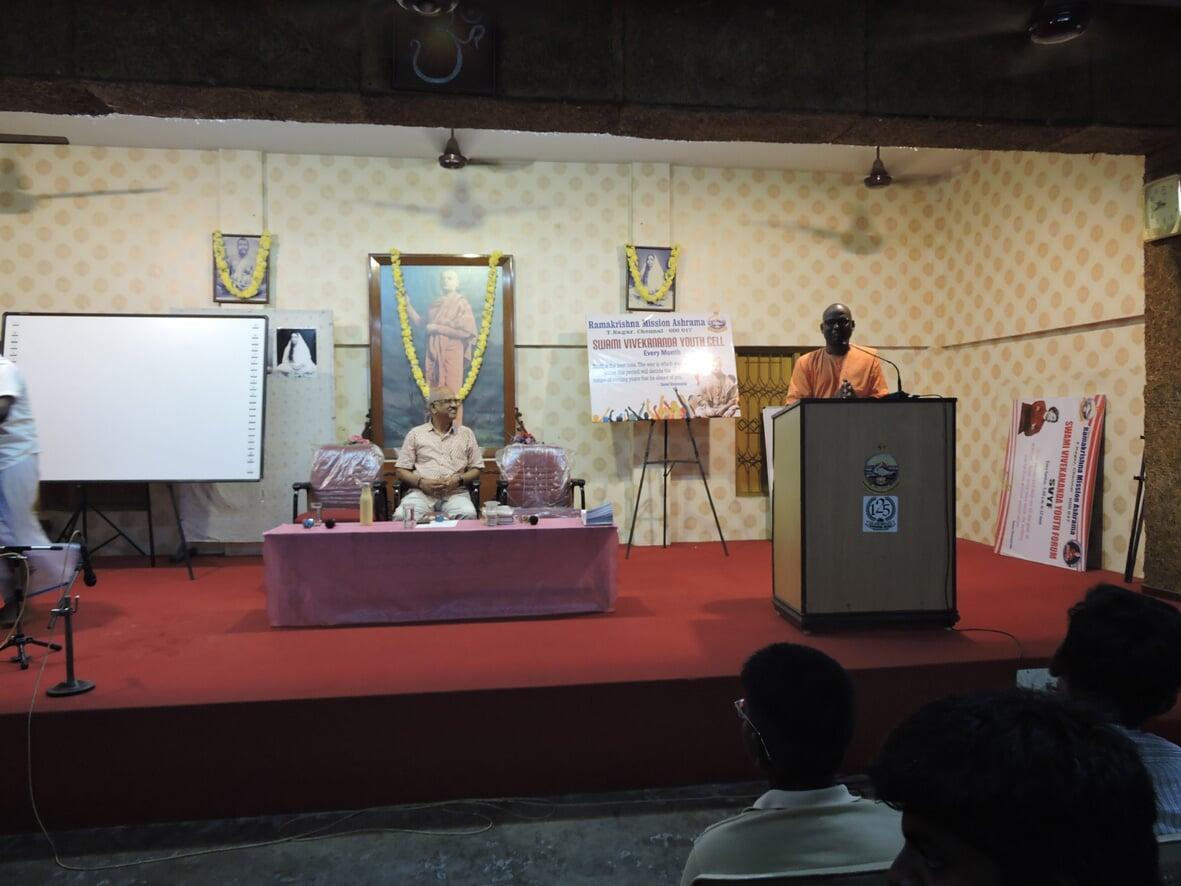
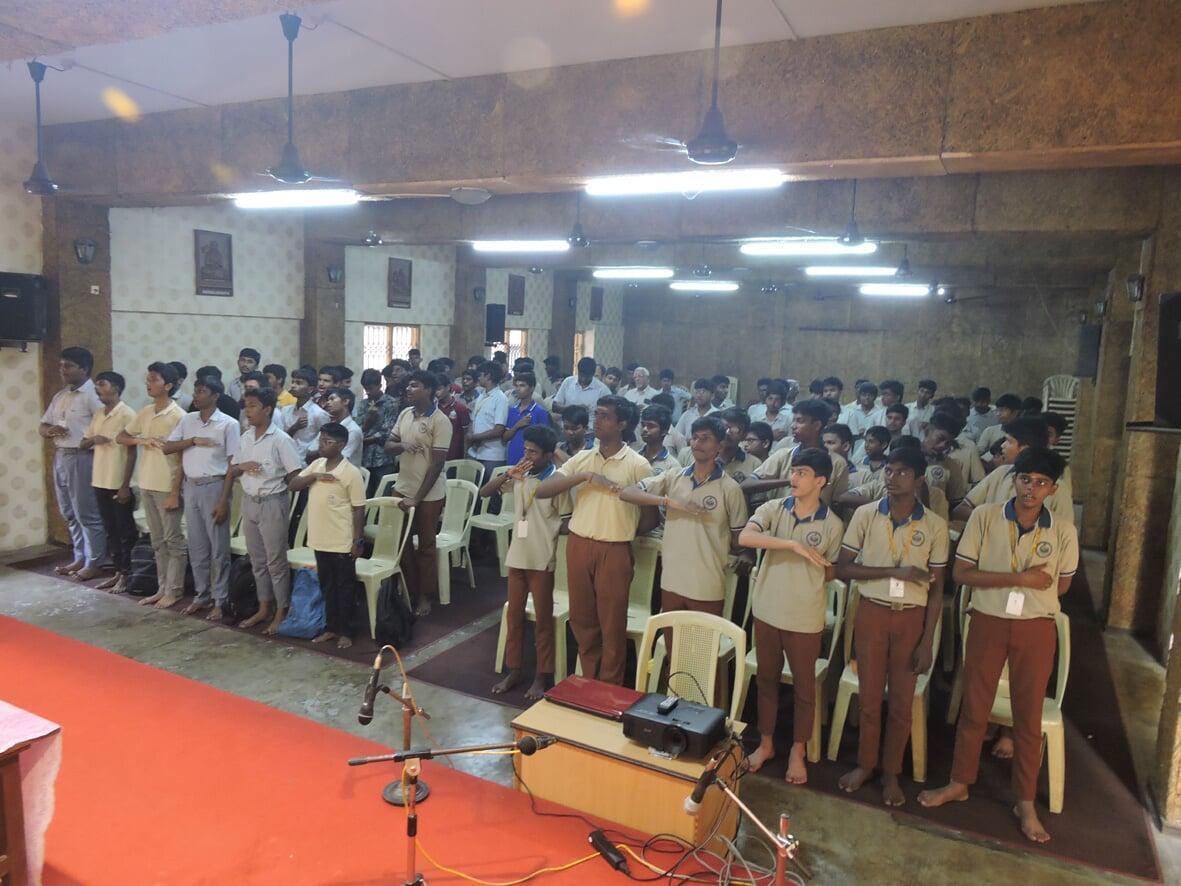
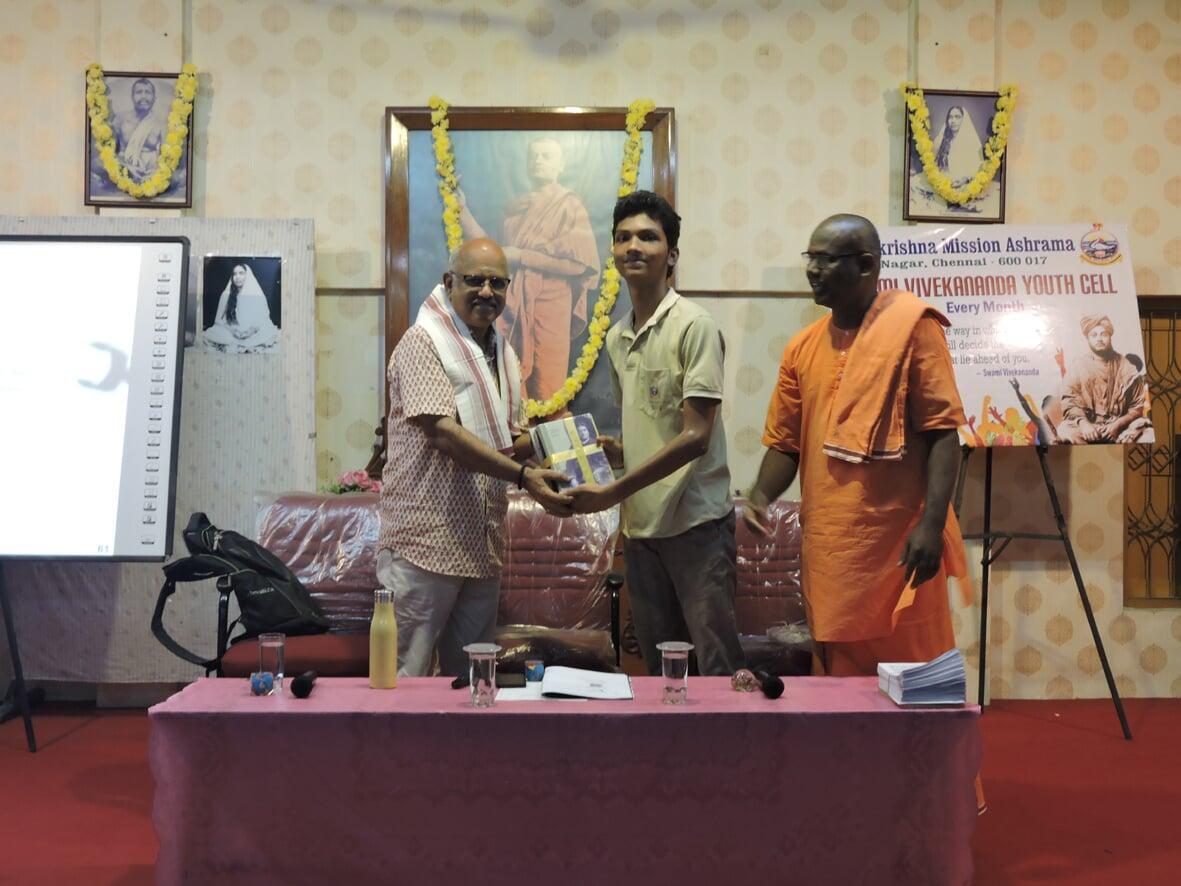
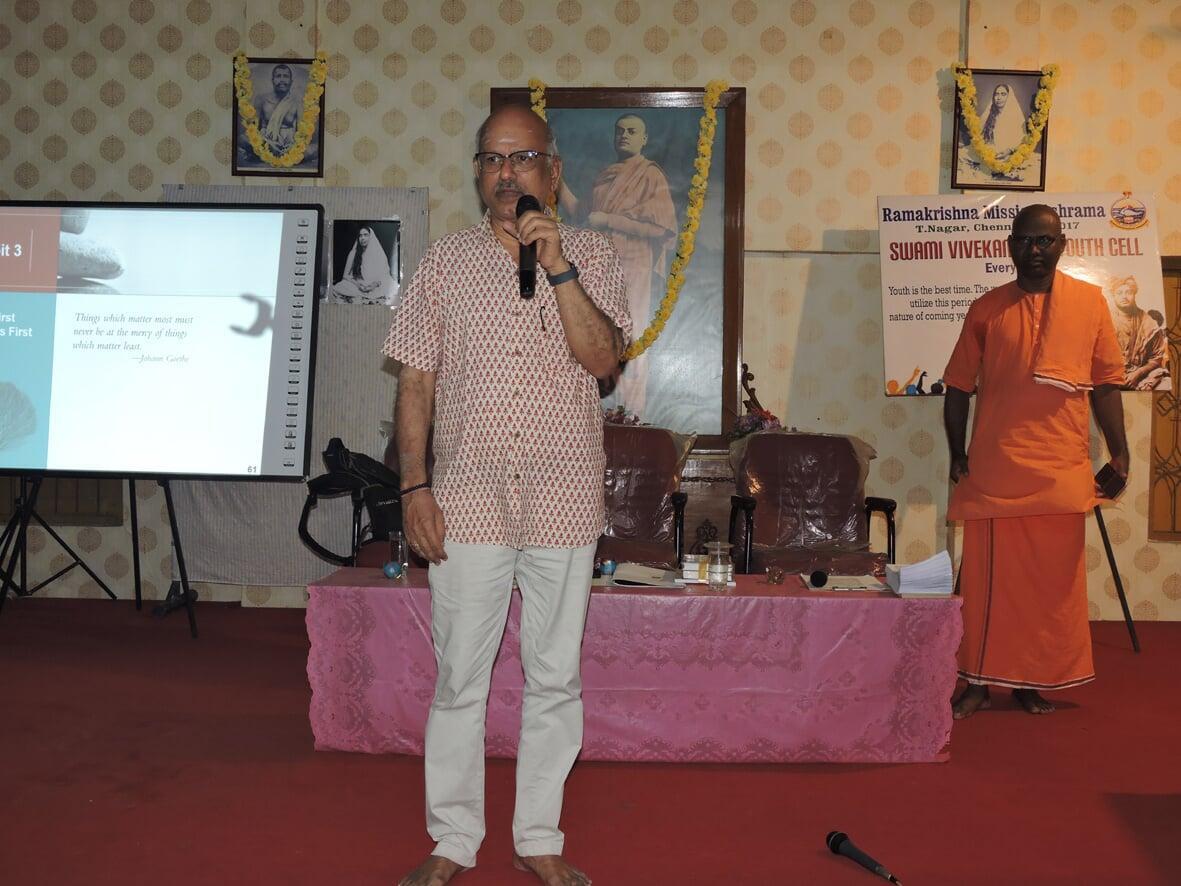
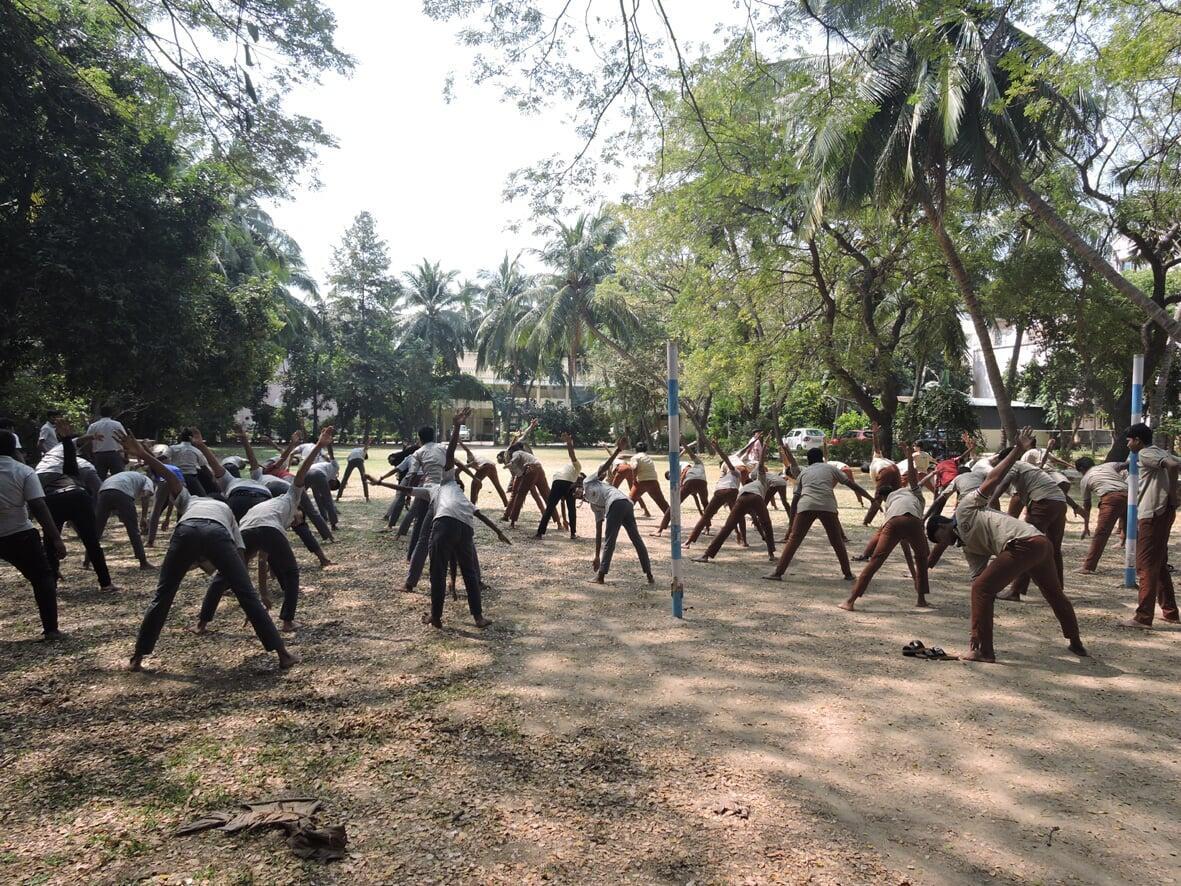
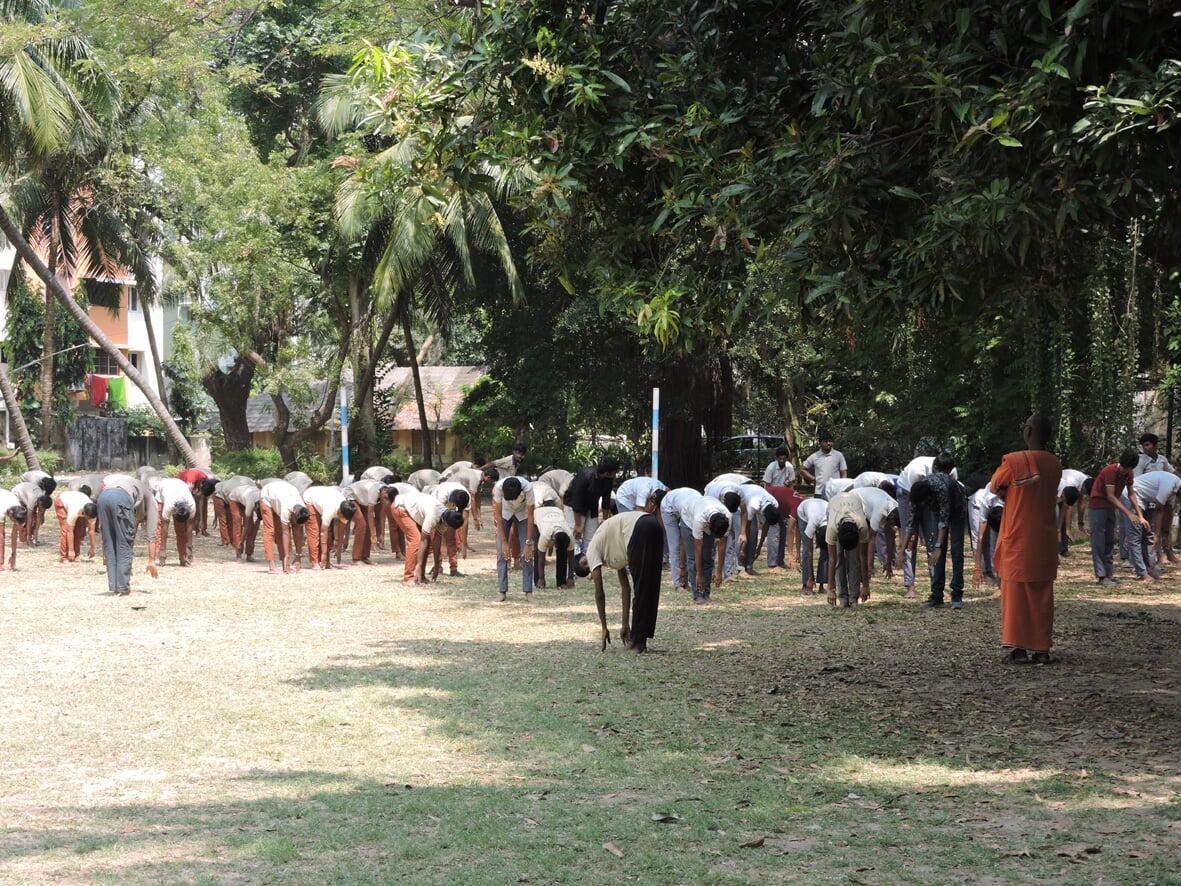
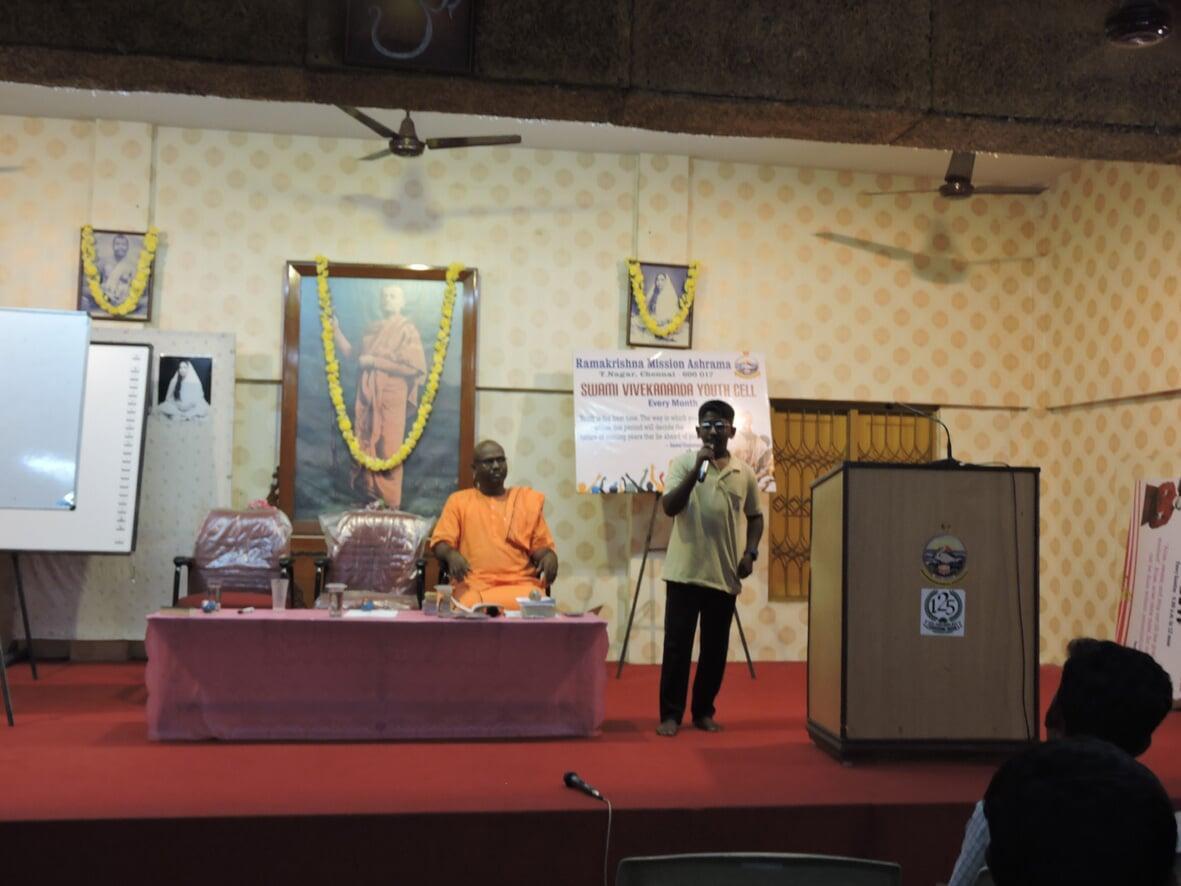
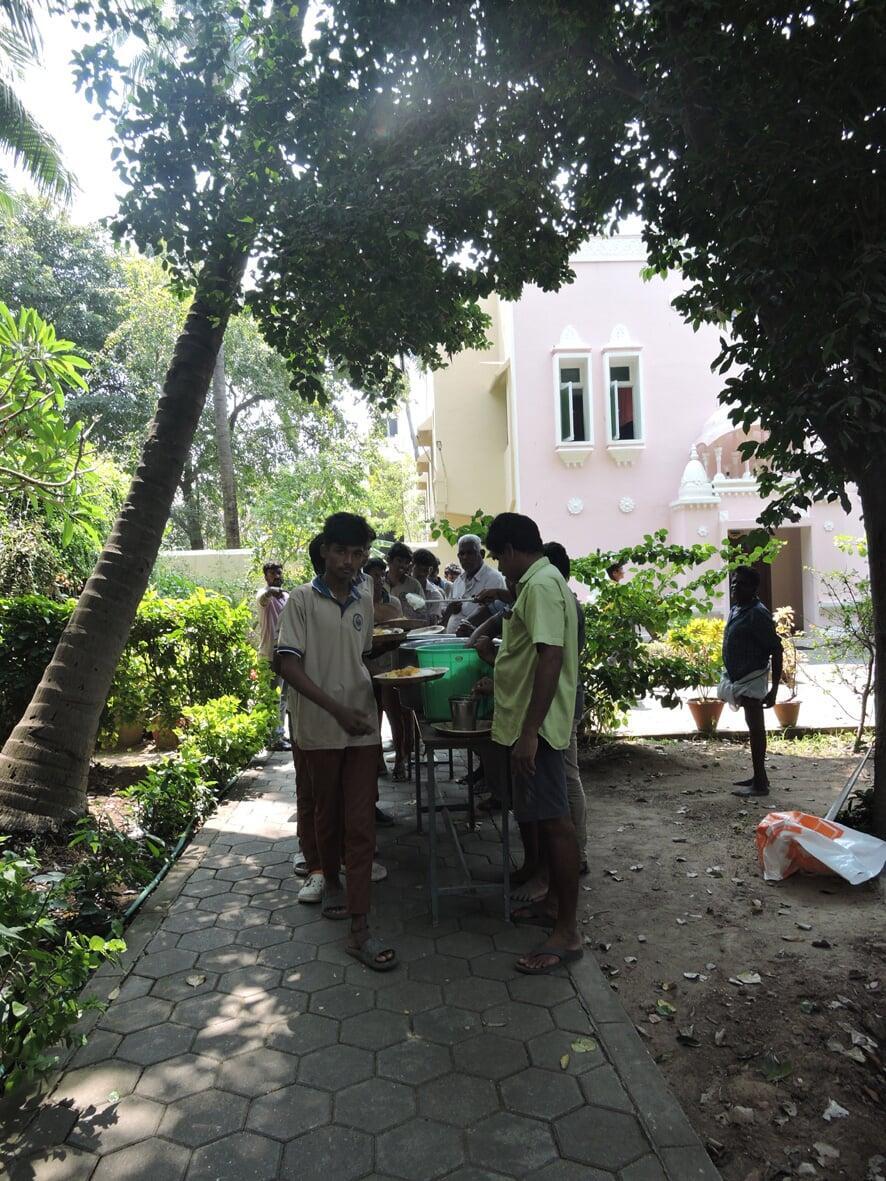
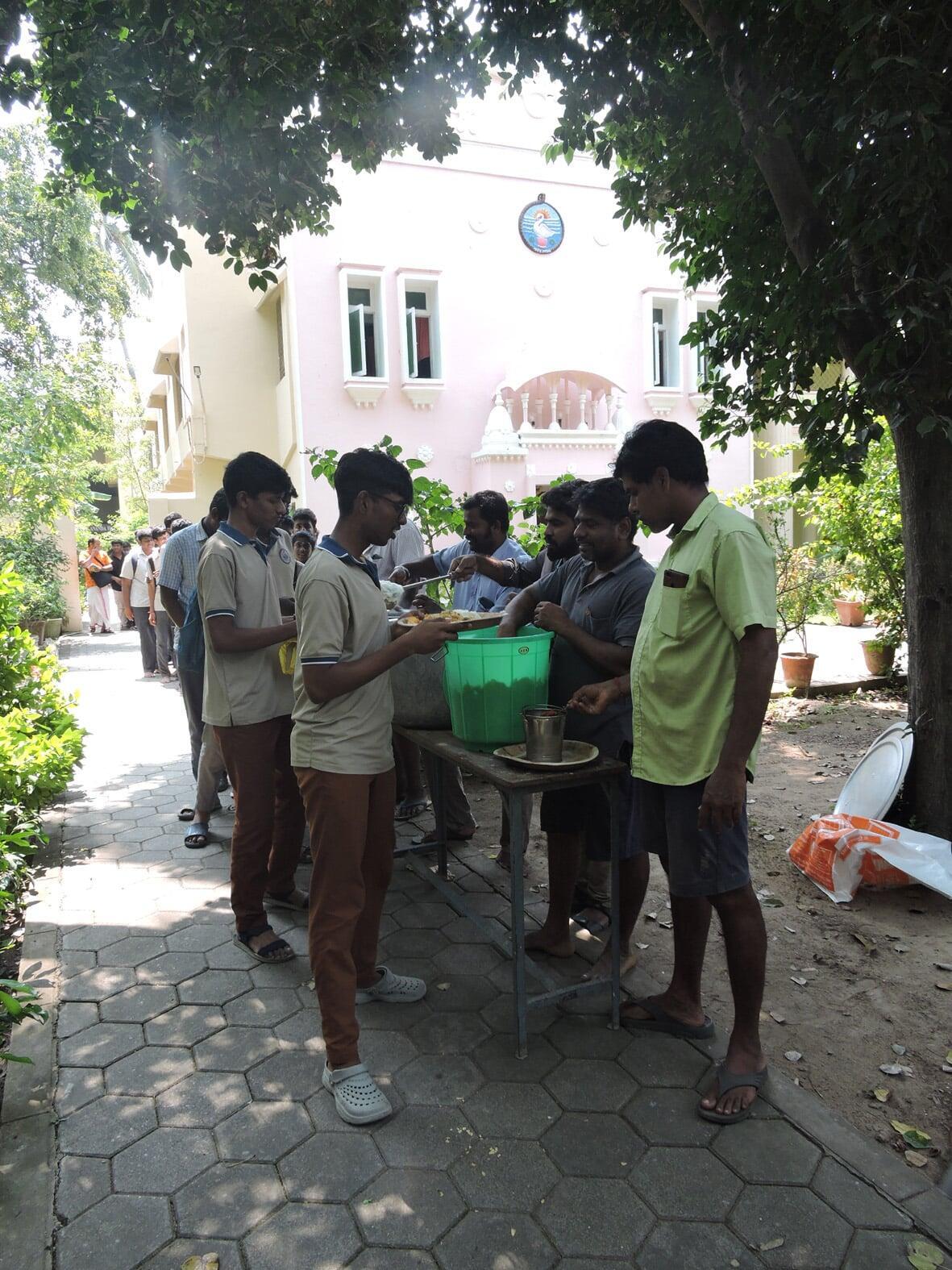
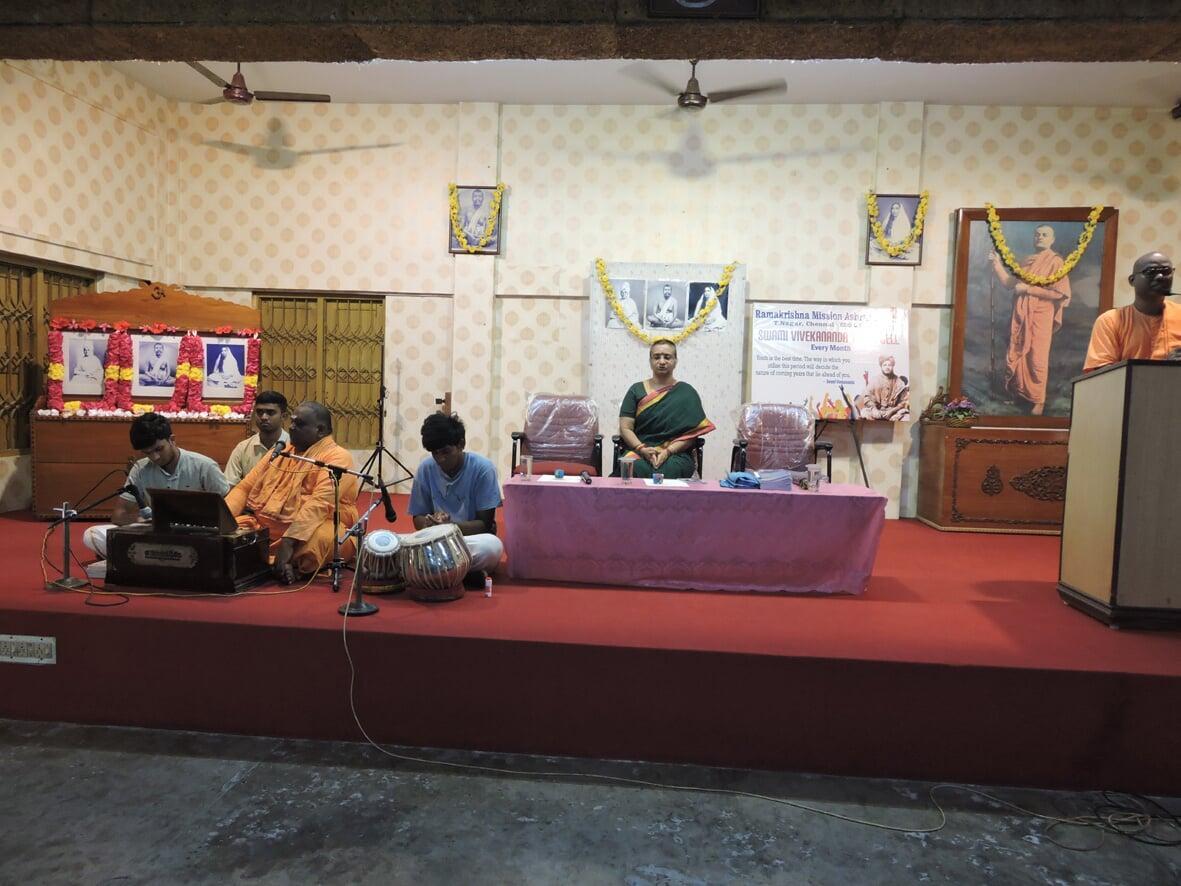
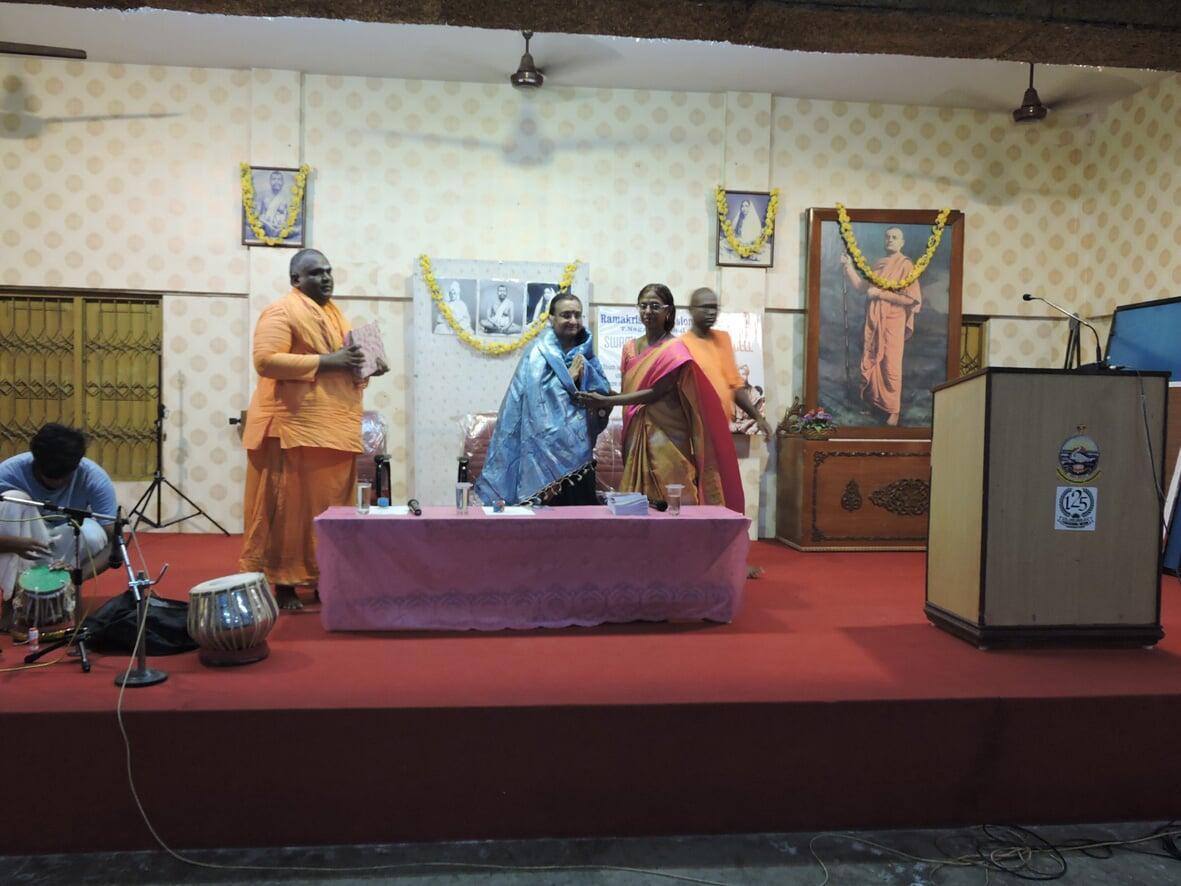
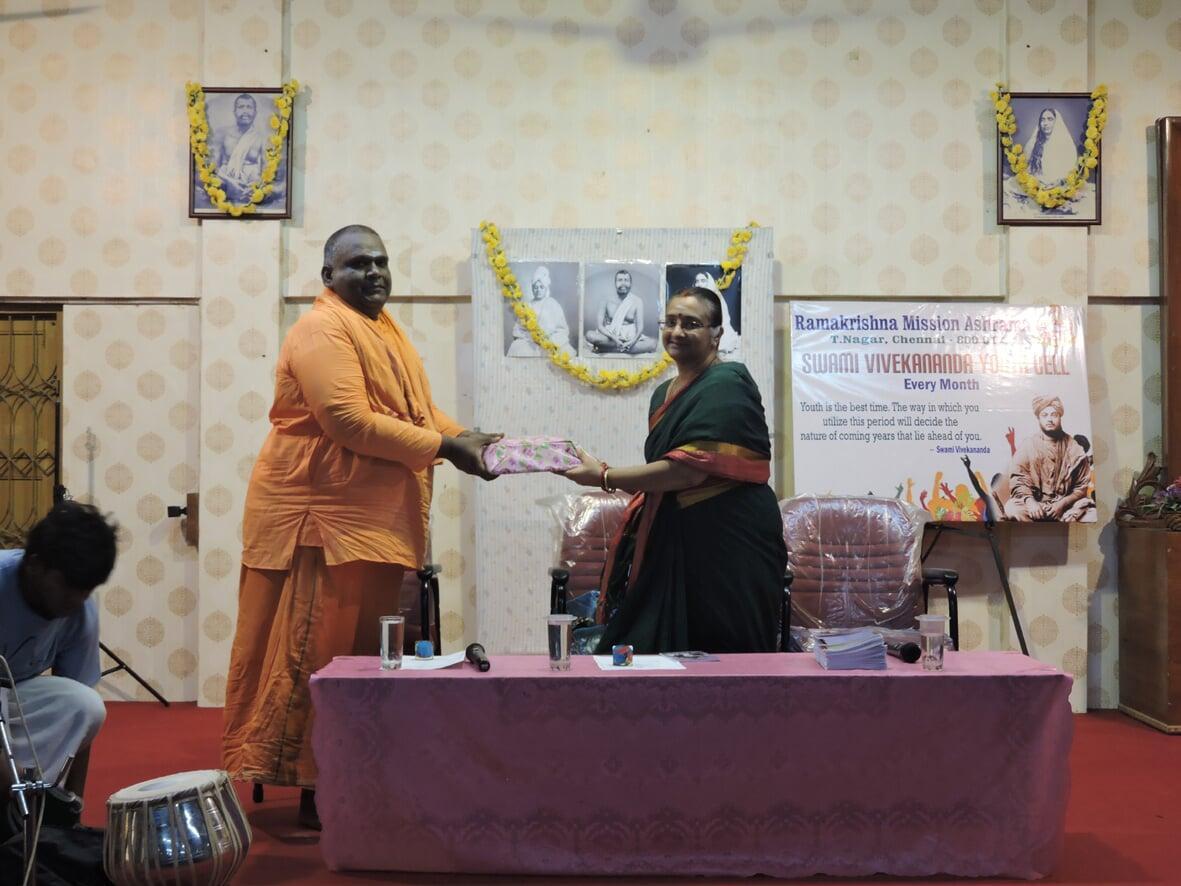
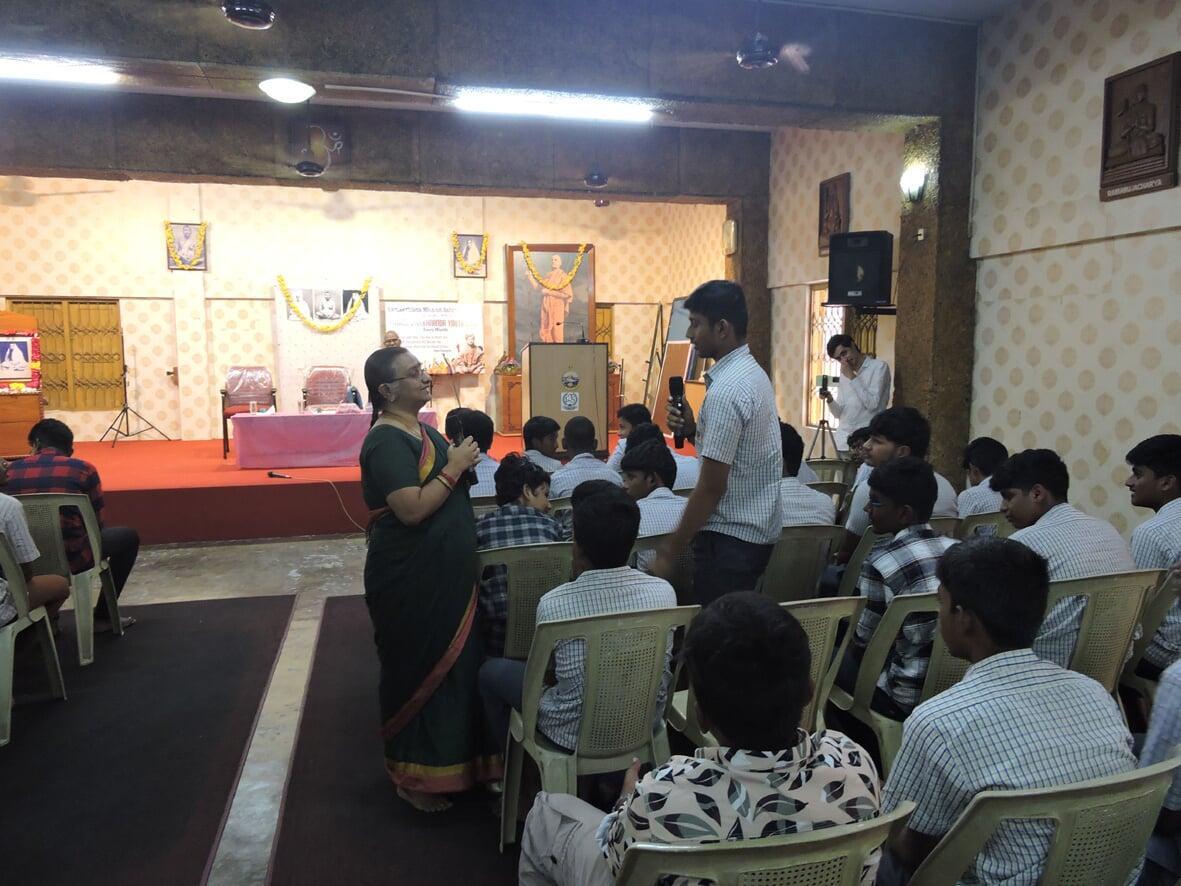
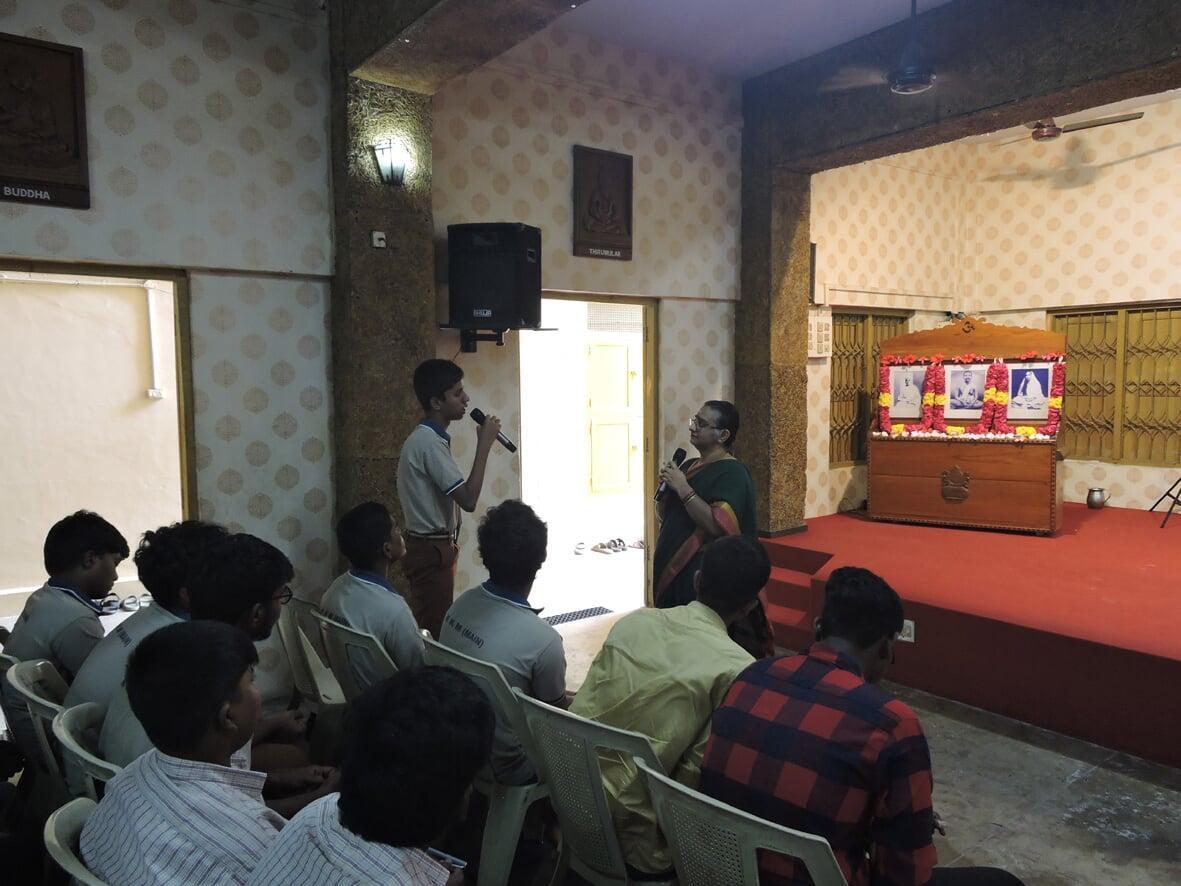
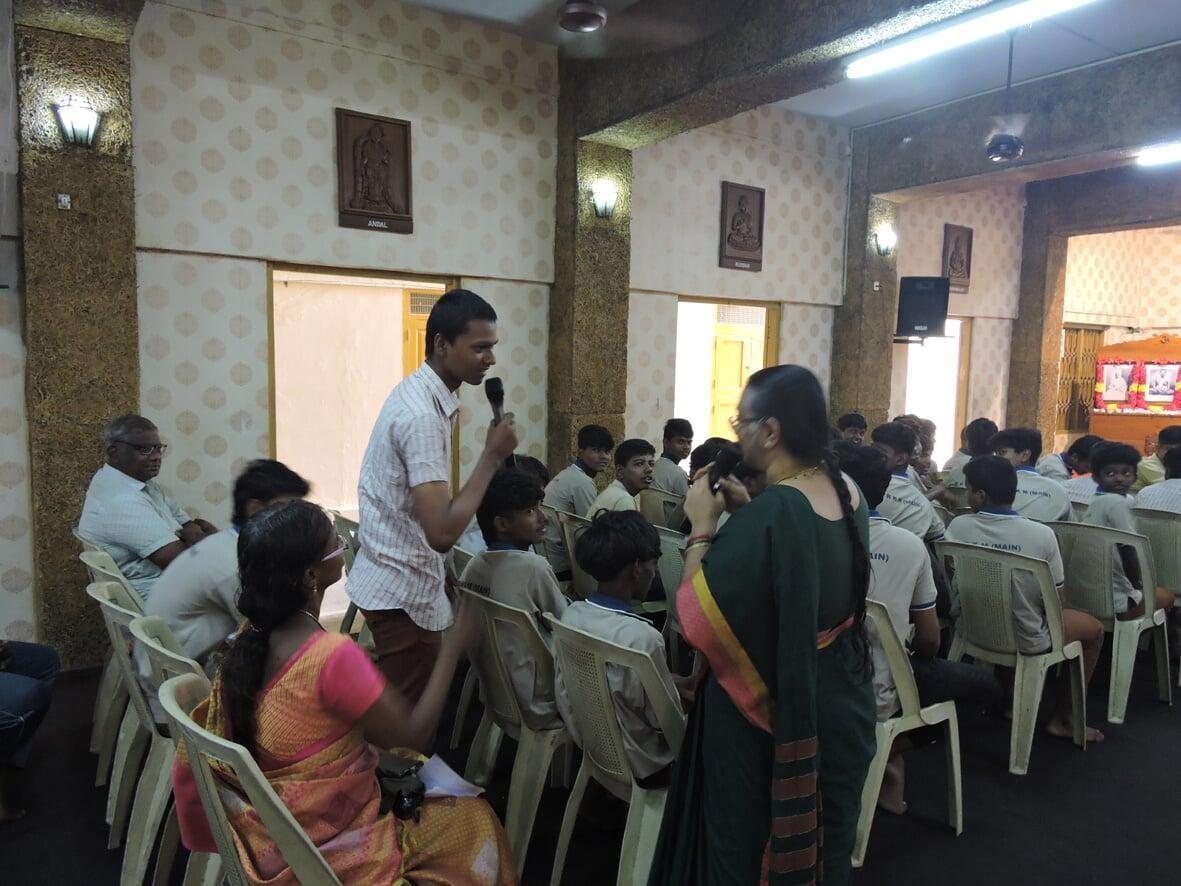
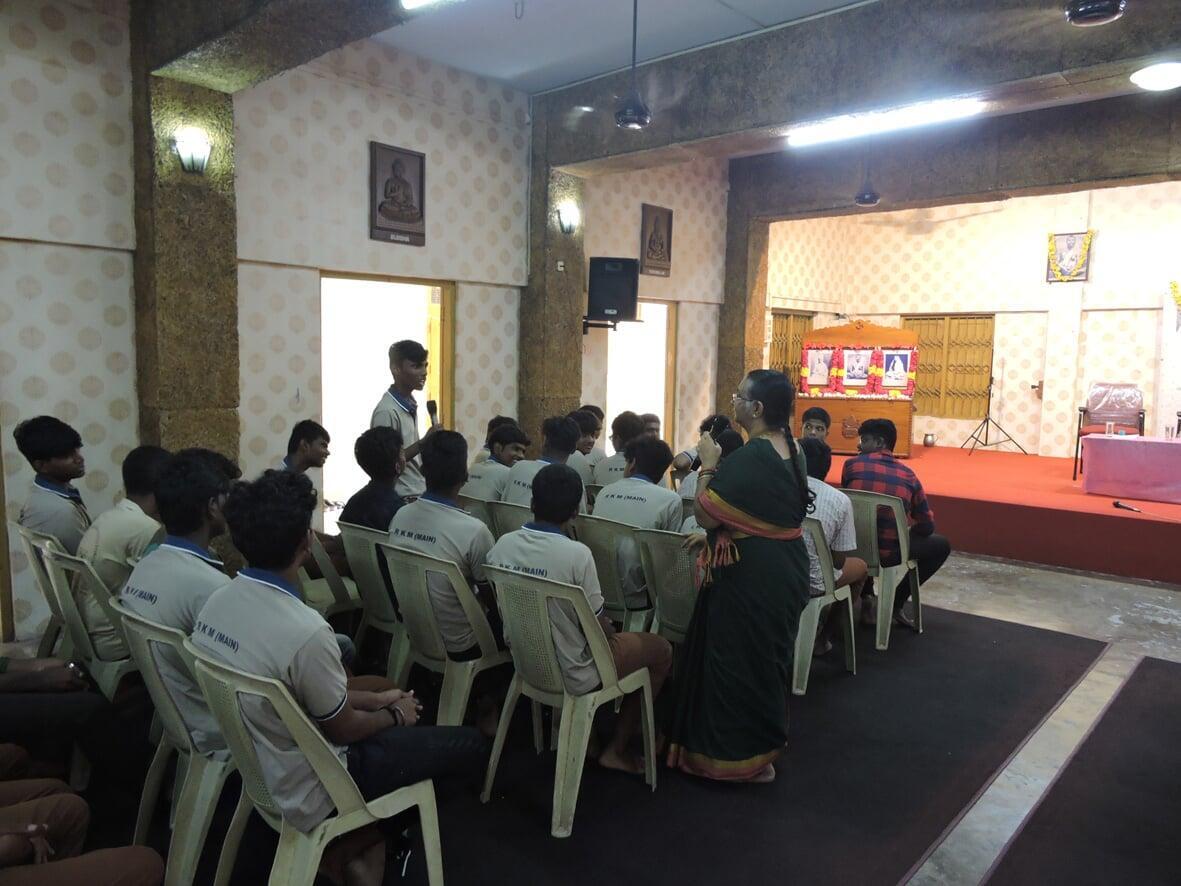
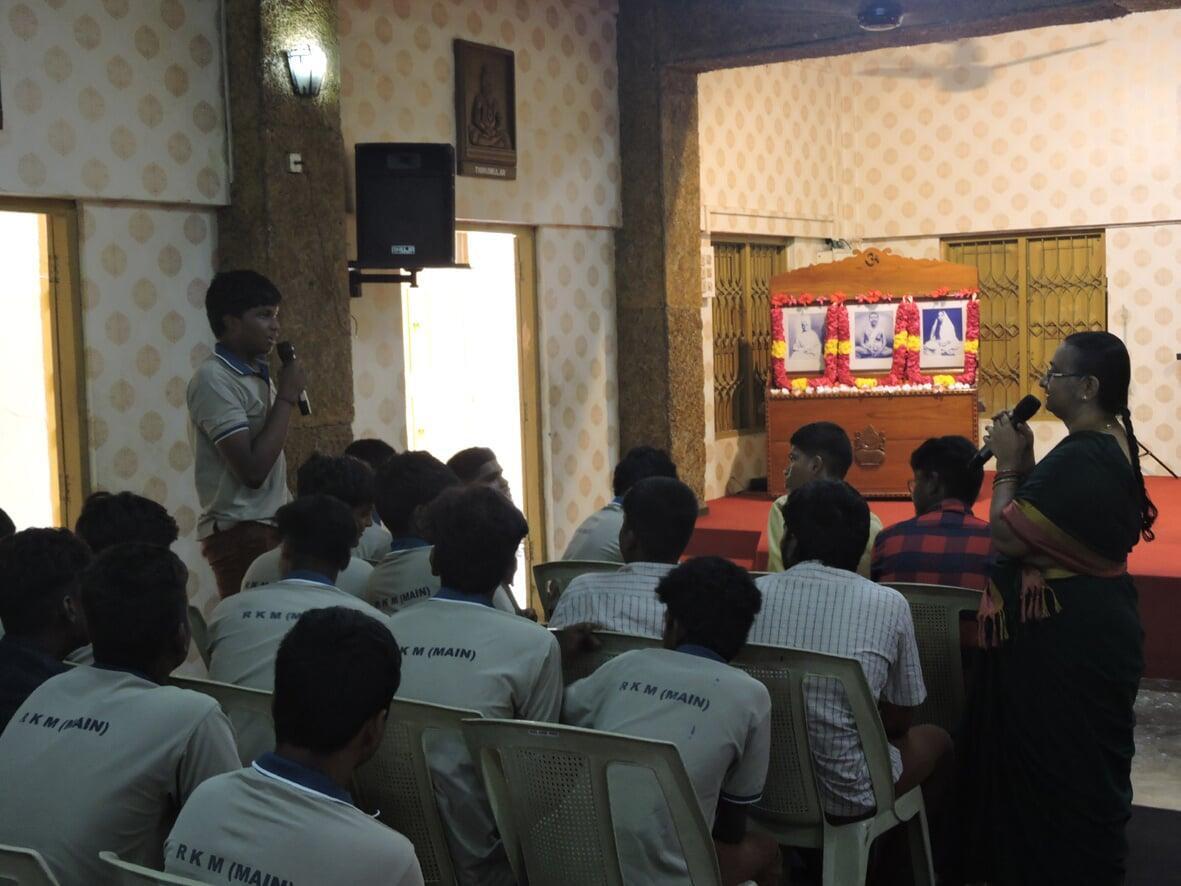
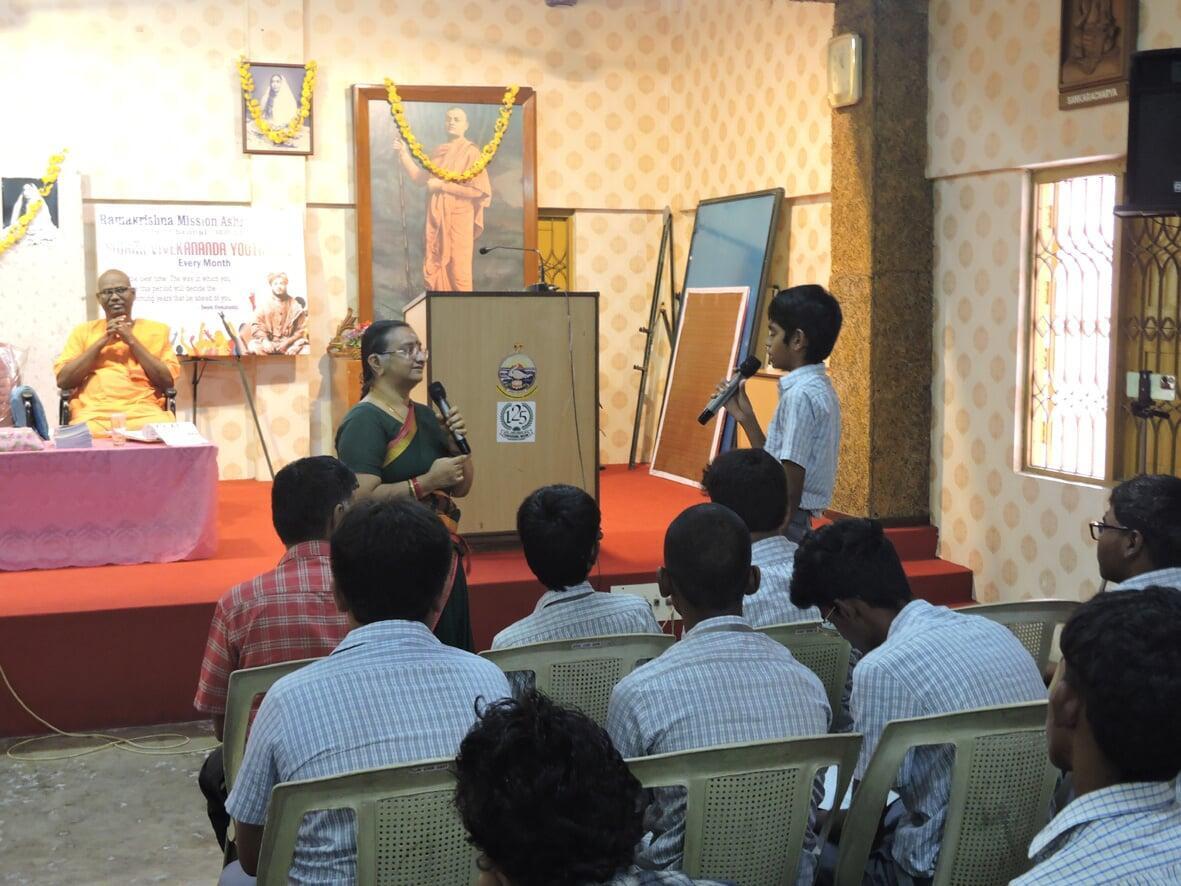
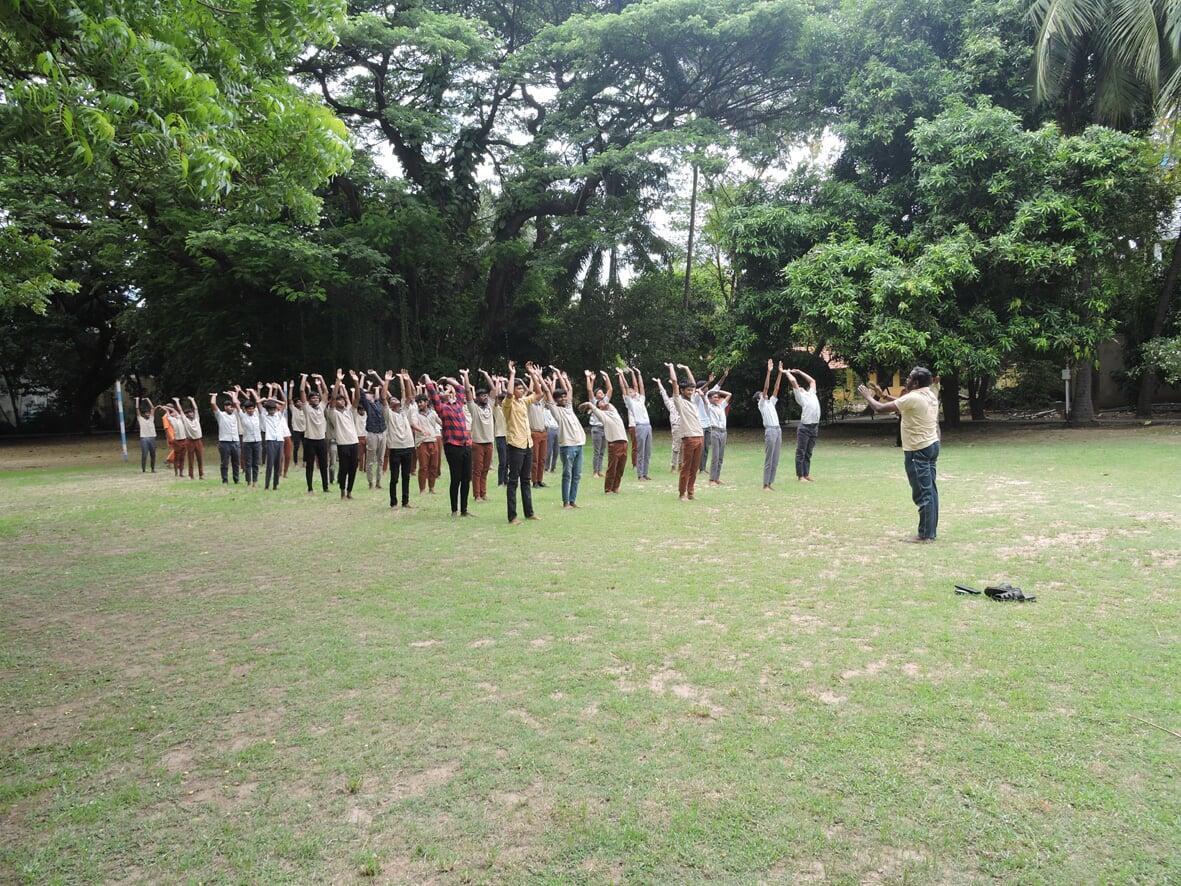
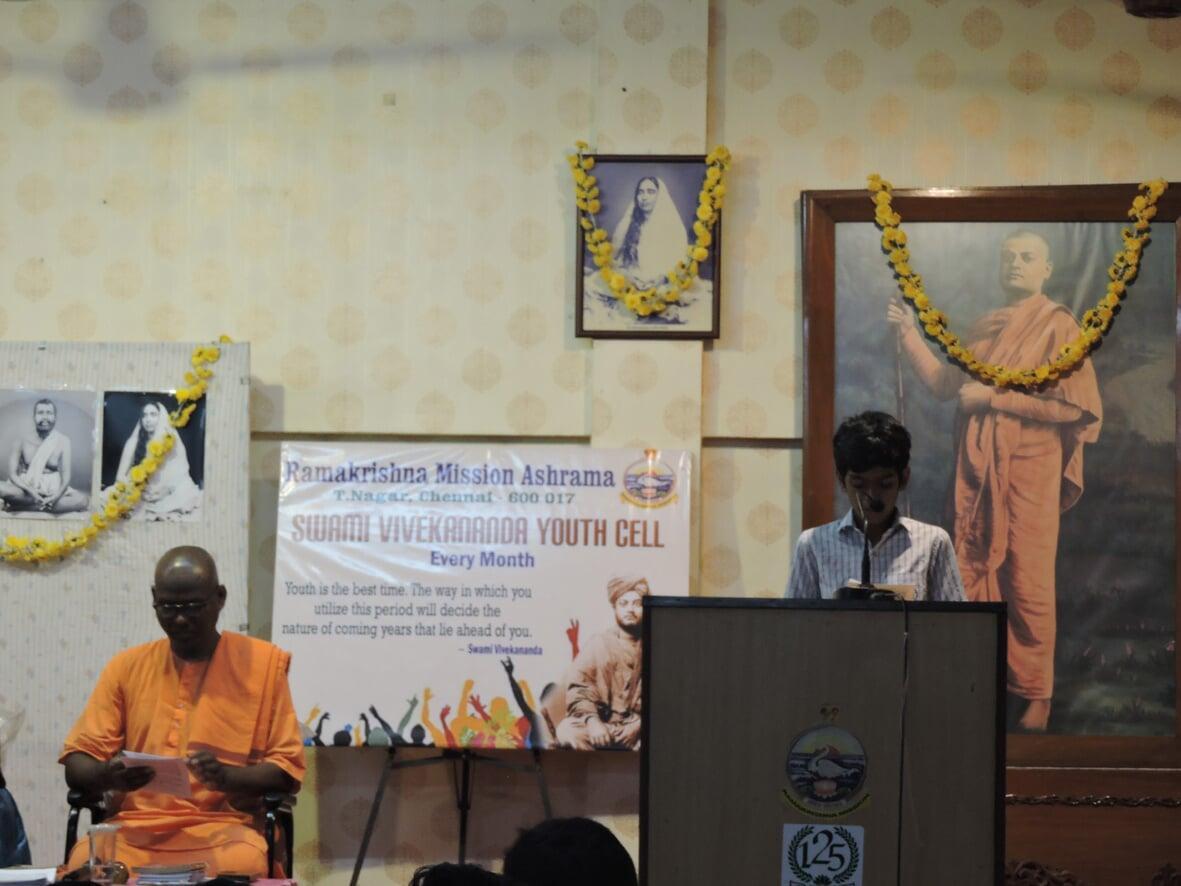

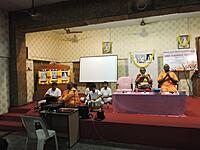


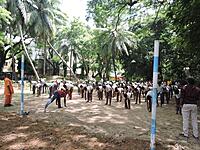
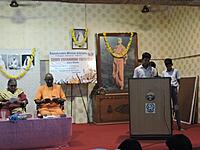
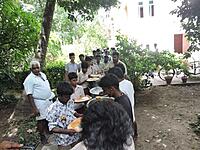


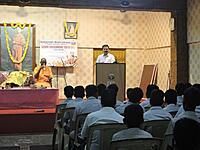
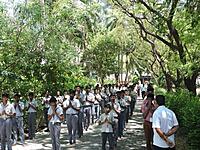

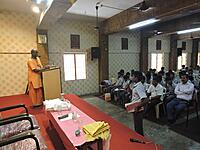
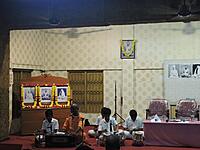

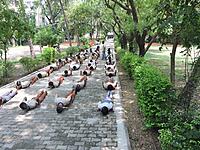
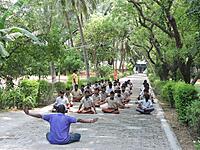
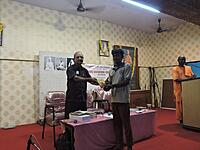
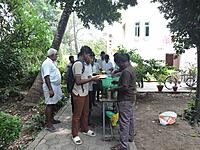










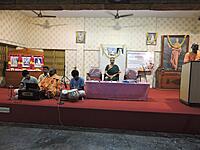





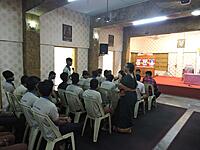
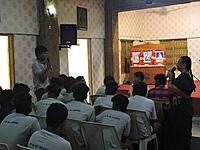



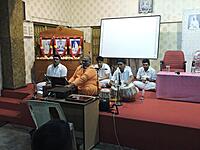
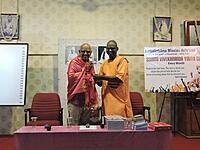
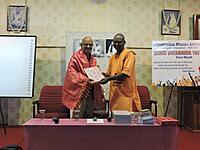
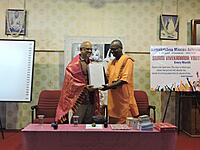
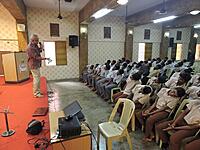
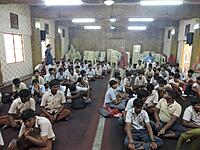
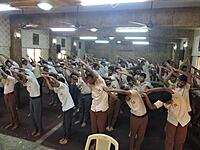
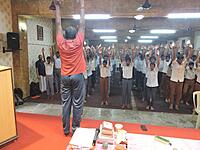
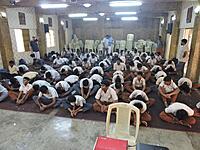
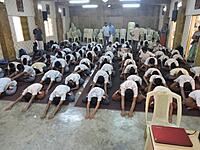
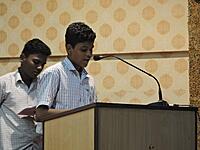
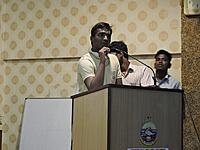
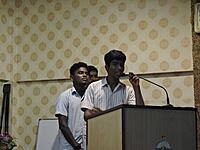
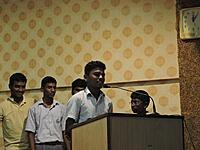
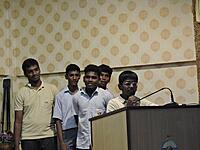
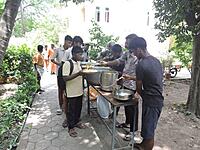
Minutes of the Youth Cell - July 2025
Seventy-seven students and seven volunteers attended the session. After registration, the session commenced with a 15-minute guided meditation led by Swami Guruvarananda, followed by bhajans performed by Swami Shuddhabrahmananda. The next part of the event featured all the students coming together to recite the "Swadesha Mantra", which is a pledge inspired by Swami Vivekananda.
In his keynote address, Swami Guruvarananda reminded the students about the homework assigned the previous month: to list their activities at the end of each week and reflect on how their habits influenced their lives during that time. He began with the quotation, “Watch your thoughts; they become your words. Watch your words; they become your actions. Watch your actions; they become your habits. Watch your habits; they become your character. Watch your character; it becomes your destiny.” He shared that our thoughts influence what we say and do. As time goes on, the things we do regularly can become habits. These habits play a big role in shaping who we are and can influence our future.
Swami Guruvarananda emphasised the importance of monitoring one’s thoughts and encouraged students to evaluate their weekly actions—both positive and negative. By regularly reflecting on their behaviours, students could work to reduce their negative actions and enhance their positive ones. He pointed out that concentration of the mind and good character are essential for success. He shared anecdotes from the life of Swami Ramakrishnananda (Sasi Maharaj), illustrating how he practised maintaining full concentration on his tasks at all times, achieving perfection in everything he did.
To further explain the concept of concentration, Swami Guruvarananda narrated a story about a student who approached his Guru to learn about the importance of focus. During lunch, the Guru was fully concentrated on eating, while the student was physically present but distracted, asking questions about concentration. Once lunch was over, the Guru asked the student if he enjoyed the meal. The student replied that it was fine and felt annoyed that the Guru was only interested in discussing lunch rather than the topic of concentration.
The Guru then explained that true concentration can only be achieved when one perfects every action they undertake. He was ready to discuss the details of the lunch they had just shared, while the student struggled to remember the specifics, indicating his lack of concentration. Realising the significance of engaging fully in each task, the student understood that striving for perfection in everyday activities could gradually enhance his ability to concentrate his mind effectively.
The next session featured the introduction of the guest speaker, Sri Kumar, a leading professional trainer specialising in leadership development. He was honoured with the presentation of mementos to the esteemed chief guest, which included books, a shawl, and a statue of Swami Vivekananda.
The guest speaker addressed the topic "Critical Thinking (Think Outside the Box)." He engaged the students with a video presentation and a series of activities. The chief guest began his session with an engaging activity involving a water bottle. He instructed the students to move the bottle sideways, up, and down while synchronising their body movements accordingly. Then, he challenged the students to repeat the exercise but do the opposite of their previous actions, thus helping to activate their minds and keep them alert for his session.
Another exercise involved taking an A4 sheet of paper and folding it into a circle. All students were then divided into groups and tasked with coming together within that circle without tearing the paper. These two exercises encouraged the students to break away from conventional thinking and to adopt an "out of the box" mindset, thereby expanding their minds beyond their current limitations. This approach resonated with Swami Vivekananda's belief that "Expansion is life. Contraction is death."
To further stimulate creative thinking, the guest speaker showcased two videos that encouraged students to engage in "out of the box" thinking. Following this, a 20-minute yoga session was led by Shri Veerabhadran, a volunteer yoga teacher, who guided the students through basic exercises.
After the yoga session, we enjoyed a reading from the book "Enathu Bharatham Amara Bharatham". The reading focused on inspiring quotes from Swami Vivekananda. After reading a few pages, a discussion ensued, encouraging students to share quotes from memory. Most of the students participated in this exercise, reinforcing their understanding of the important teachings of Swami Vivekananda.
Finally, a summarising session was held, with one student from each school presenting the main objectives of the youth cell they had attended. The feedback was positive and thought-provoking.The program concluded with prayers and a lunch prasad served to all students.
Minutes of the Youth Cell - Jun 2025
A total of 105 students and 7 volunteers participated in the session. The program commenced with a guided meditation practice and Vedic chanting led by Swami Guruvarananda. After that, the bhajans were conducted by Swami Shudhabrahmanandaji Maharaj. He performed three songs in honour of Lord Ganesha, the goddess Saraswati, and Sri Ramakrishna. Everyone joined in and happily sang along with him. Next, the participants took an oath while standing, reciting the Swadesha Mantra of Swami Vivekananda together.
Swami Guruvarananda, in his keynote address, asked an interesting question to the students: What things help us succeed or make us fail? He said that the answer is found in our "habits". He shared a quote from the Bhagavad Gita (6.5): "A person should help themselves and not bring themselves down. Our self can be our best friend or our worst enemy."
Swami Guruvarananda explained the difference between actions and habits, stating that while an action is done once, repeated actions become habits. He elaborated that thoughts become words, words become actions, actions become habits, habits shape character, and character ultimately determines destiny. He noted that if a person practises an action continuously for 90 days, it becomes a habit.
To illustrate effective time management, Swami described the daily routine of Dr Abdul Kalam, a notable role model for the students. Mr Kalam began his day at 4 a.m. and meticulously followed a schedule that included prayer, meditation, and personal readings until 11 p.m. This example was shared to inspire students, demonstrating how regulating daily life down to the finest details could help develop good character and provide support during challenging situations.
Swami Guruvarananda concluded by assigning homework to all students: they were to list their daily activities and determine which were actions and which were habits. The next session included a special guest speaker; Smt Varsha is a volunteer at the Vivekananda Cultural Centre in Vivekanandar Illam. She has a master's degree in management and inspires students participating in the program. She was felicitated with gifts, including books and a shawl, as a token of appreciation. Smt. Varsha began her talk on the topic, "Inspiring Message of Swami Vivekananda for the Youth: For the Better Student".
The chief guest delivered a PowerPoint presentation on this topic, outlining key points and highlighting several quotes from Swami Vivekananda:
1. "We want that education by which character is formed, strength of mind is increased, the intellect is expanded, and by which one can stand on one's own feet." To explain the significance of this important quote, she shared an example from the life of Dr. A.P.J. Abdul Kalam, drawing on her personal experiences. She recounted her visit to the old librarian at the Vikram Sarabhai Space Centre (VSSC) in Thiruvananthapuram, where she recalled how, during the pre-Google era in 1963, Dr Kalam would spend a great deal of time reading the latest books on science and technology in the library. This dedication contributed to the expansion of his intellect. When Dr. Kalam later became the President of India in 2005 and visited the VSSC, he always made a point to greet the librarian, even after 42 years. This demonstrated his respect for others, as he enquired about her family and acknowledged the contributions of those who had helped him along his journey.
2. "All great works undertaken are achieved through mighty obstacles. Stand up, be bold, be strong! Know that you are the creator of your destiny. All the strength and support you want is within yourself." To illustrate this quote, Smt. Varsha provided another example from Dr. Kalam's life, explaining how he took full responsibility for Indian space research and played a crucial role in its development. The seed of his efforts has grown into a flourishing tree today, thanks to Dr Kalam's hard work and dedication.
Swami Vivekananda's remedy for overcoming bad habits is to cultivate good counter-habits. By consciously developing positive habits and engaging in virtuous actions, individuals can gradually replace negative patterns with constructive ones. In essence, replacing bad habits with good habits is essential for reforming one's character and overcoming negative tendencies.
The main speaker compared the way our minds can wander to the playful and mischievous behaviour of monkeys. In contrast, she described good habits as a colourful flying elephant holding a lotus flower in its trunk. She encouraged the students to concentrate on the idea of this flying elephant, which symbolises good habits, and to cultivate this image as a strategy to help control their wandering thoughts and overcome bad habits.
The chief guest also shared a powerful quote from Swami Vivekananda: "Take up one idea. Make that one idea your life; dream of it; think of it; live on that idea. Let the brain, the body, muscles, nerves—every part of your body—be full of that idea, and just leave every other idea alone. This is the way to success, and this is the way great spiritual giants are produced." She illustrated this point by highlighting two great personalities who embodied this principle and achieved success:
1. Dr. Sreedharan, known as the "Metro Man", began his dream project in Kolkata on October 24, 1984, which has since expanded to 15 cities across 11 states in India. 2. Lahari Bai, a 27-year-old woman from the Baiga tribe in Dindori, Madhya Pradesh, has emerged as a beacon of hope for preserving indigenous crops and traditional knowledge. For over a decade, she has worked tirelessly to safeguard her people's millet varieties, known as 'Shree Anna', from extinction.
Swami Vivekananda's quote, "One of the greatest lessons I have learnt in my life is to pay as much attention to the means of work as to its end," emphasises the importance of focusing on the journey toward a goal, rather than just the destination. Through these five important quotes from Swami Vivekananda, the chief guest impressed upon the attentive students the necessity of:
1. Developing good character
2. Strengthening the mind and intellect
3. Overcoming obstacles
4. Cultivating good habits (symbolized by the flying pink elephant with a lotus flower)
5. Focusing on one idea and pursuing it to the end
6. Recognizing and controlling the "fires" (uncontrolled passions) in their lives
The next session was a 20-minute yoga class led by Sri Veerabhadran, a volunteer yoga teacher, which included Surya Namaskar and basic exercises.
Following that, we had a reading from the book "Enathu Bharatham Amara Bharatham", which was written by Swami Vivekananda. After the reading, the students were engaged in a discussion to share their thoughts and insights about what they had just heard. A question-and-answer session ensued, during which students who successfully answered questions were awarded books as prizes. Finally, the program concluded with a summarising session where one student from each school shared their learnings from the Youth Cell program. The overall feedback was very positive. The event concluded with prayers, followed by lunch prasad served to all students.
Minutes of the Youth Cell - May 2025
The event witnessed the enthusiastic participation of fifty-four students in the youth cell program hailing from various educational institutions, along with six dedicated volunteers who contributed to its success. The program began with a peaceful guided meditation practice and heartfelt prayers led by Swami Guruvarananda, promoting a sense of peace and mindfulness among participants. This initial segment set a contemplative tone for the day.
A vibrant bhajan session was conducted by Swami Shudhabrahmanandaji Maharaj and his talented team. They joyfully performed three devotional songs dedicated to the Holy Trio of Sri Ramakrishna, Sri Sarada Devi, and Swami Vivekananda, creating an atmosphere filled with spiritual energy and devotion.
In his keynote address, Swami Guruvarananda emphasised the moral value of a well-known Tamil proverb, 'Thai Sollalai Thattathe', which translates to 'never disobey Mother’s words'. He elaborated on this wisdom by providing inspirational examples of three iconic leaders who diligently embodied this principle throughout their lives.
1 Swami Vivekananda: He honoured his mother’s influence, Smt Bhuvaneswari, who once predicted the possibilities for her son’s future and impacted the world with his teachings. His journey began with his impactful speeches at the Chicago Parliament of Religions in 1893, sparking global interest. He delivered India’s spiritual heritage message to the world.
2 Sri Visveshvaraiah: He is acknowledged as one of India’s preeminent civil engineers. He heeded his mother’s advice and dedicated his life to improving the nation’s infrastructure. His visionary projects included the creation of pipelines to provide accessible water to countless villages, thereby transforming rural India Swami Guruvarananda highlighted that personal aspirations should inspire individuals to put in hard work rather than giving in to laziness. Following his address, Swami Guruvarananda introduced the esteemed guest speaker, Smt Krishnaveni from Chennai, who was warmly honoured with mementos, including a traditional shawl and selected books, as a token of appreciation for her contributions.
In her engaging speech, Smt Krishnaveni delved into the theme of "Leadership Lessons from the Ramayana and Thirukkural". Drawing inspiration from Swami Vivekananda, she highlighted two critical leadership qualities: no jealousy and no selfishness. She elaborated on eight essential qualities of effective leadership, which she skilfully illustrated with relevant examples from the Ramayana and poignant couplets from the Thirukkural:
1. Education: Swami Vivekananda recognised education as a powerful tool for societal change. His extensive travels across India in the 1890s allowed him to grasp the multifaceted challenges faced by the populace, leading to insightful solutions presented during the Chicago Parliament in December 1892.
2. Independent Thinking Skills: The significance of independent thinking and critical reasoning in leadership.
3. Art of Speaking: Mastery in effective communication to convey ideas with clarity and persuasion.
4. Art of Listening: The skill of attentive listening, fostering deeper understanding and connection with others.
5. Empathy: The capacity to understand and resonate with the emotions and experiences of others, fostering compassion in leadership.
6. Assessment: The ability to evaluate situations with discernment and make informed decisions.
7. Determination: A steadfast commitment to pursuing goals despite challenges and obstacles.
8. Composure: Maintaining a calm demeanour in high-pressure situations, which is vital for effective leadership.
After her inspiring talk, participants engaged in a rejuvenating 20-minute yoga session, which included the traditional Surya Namaskar and basic exercises, skilfully led by volunteer yoga instructor Sri Veerabhadran.
This session not only promoted physical well-being, but also the activities were designed to promote unity among participants by engaging them in shared physical experiences.
The program continued with a reading from Swami Vivekananda's work, "Enathu Bharatham Amara Bharatham", specifically under the title 'Sri Ramakrishna', which highlighted the profound teachings of Sri Ramakrishna and their relevance in contemporary ideas.
The next was followed by an interactive question-and-answer session, which encouraged engagement and reflection among the students. The successful participants who answered correctly were rewarded with books from the chief guest, further promoting a culture of learning and inquiry.
To conclude, representatives from each school shared summaries of the main objectives they had gleaned from attending the Youth Cell program, reflecting the overall positive feedback and transformative experiences encountered.
The program wrapped up with collective prayers, and a delicious lunch of prasad was distributed to all attendees, fostering a spirit of community and gratitude.
Minutes of the Youth Cell - April 2025
Attendance: 46 students and 7 volunteers
The Youth Cell program commenced with a 20-minute guided meditation session, followed by bhajans led by Swami Guruvarananda. Next, the students collectively recited the "Swadesha Mantra", a pledge by Swami Vivekananda.
In his keynote address, Swami Guruvarananda referenced a well-known saying by Swami Vivekananda: "Each soul is potentially divine; you can do anything and everything." He illustrated this concept by sharing the story of Jambavan, who highlighted Hanuman's strengths, emphasising that Hanuman had forgotten his potential due to a curse. Swami Guruvarananda likened the role of a guru to that of a Jambavan, as they guide individuals to recognise and realise their potential.
The speaker delved into Hanuman's resourcefulness in overcoming challenges during his quest to find Mother Sita, positioning him as an exemplary figure for the youth. He stressed that the divine essence resides within everyone, though it often remains unrecognised. He shared an impactful anecdote about a beggar who spent his life in poverty, only for the community to discover a pot of gold coins in the same spot after his passing. This story suggests that many individuals are unaware of their vast potential.
After his address, Swami Guruvarananda introduced the guest speaker, Shri T.M. Soundarajan, an assistant professor at a law college in Chennai and a skilled linguist. He delivered his speech on "Swami Vivekananda's Perspective on Education and Youth".
He began his discussion by posing the question, "What is education?" and offered a thorough definition that included both formal and informal learning experiences.
He underscored the importance of self-belief and urged students to embrace challenges and pursue their goals with confidence. His presentation was complemented by English grammar lessons, which would be beneficial to all attendees.
After the talk, participants engaged in a 30-minute yoga session led by volunteer yoga teacher Shri Veerabhadran, which included Surya Namaskar and fundamental exercises.
Subsequently, two students read excerpts from "Enathu Bharatham Amara Bharatham", focusing on the contributions of the great Indian spiritual teachers such as Sri Sankara, Sri Ramanuja, and Sri Chaitanya. A question-and-answer session followed, rewarding students who provided correct answers with books as prizes presented by the chief guest.
The program concluded with a summary session, where a representative from each participating school shared key takeaways from the meeting. This interactive segment showcased the students' growing confidence in discussing their challenges and their strategies for applying the insights acquired. The event ended with closing prayers, followed by the distribution of lunch prasad to all students.
Minutes of the Youth Cell - March 2025
The session was attended by 88 students and 7 volunteers. The event began with Guided meditation and chanting of Vedic mantras. Next, the participants took the pledge of the "Swadesha Mantra" of Swami Vivekananda, standing in unison. Swami Guruvarananda then introduced the guest speaker, Sri Uma Sankar, the principal of PS Sivaswamy Kalalaya Matriculation School, who will speak on "The Power of Self-Confidence".
Swami Guruvarananda commenced the keynote address with a famous proverb by Swami Vivekananda: "Concentration is the essence of all knowledge." He emphasised that a trained mind seldom makes mistakes. He also shared Vivekananda’s advice: "Take up one idea, think of it, dream of it, and live on that idea," highlighting its importance in achieving success.
Furthermore, Swami Guruvarananda illustrated the concept of taking risks to succeed with a story about a king who challenged his pupils. He instructed them to open a closed door with the risk of having their hand chopped off if they failed. However, if they succeeded, they would gain half of his kingdom's treasure. All the students hesitated except for one brave individual who dared to take the risk, ultimately succeeding and winning half of the treasure. The moral of the story emphasises the importance of taking calculated risks to achieve success in life.
The next session featured the felicitation of guest speaker Sri Uma Sankar, the principal of PS Sivaswamy Kalalaya Matriculation School, who spoke on "The Power of Self-Confidence". Mementos, including books and a shawl, were presented to the esteemed chief guest.
Sri Uma Sankar began his session with a simple, open-ended question: Who can touch the ceiling fan running in the room? This question did not prompt many students to raise their hands at first. However, when he suggested that students could use a chair or a table to reach the fan or stop it, all the students raised their hands. He noted that the initial hesitation was due to:
1. Fear
2. A tendency to compare themselves with others
3. Concerns about how others might perceive them if they failed
4. A lack of self-confidence to rise to the challenge
He then shared several examples of how self-confidence can change lives:
1. At the Parliament of Religions in Chicago, Swami Vivekananda impressed everyone with his confident speech. As he stood before a large audience for the first time in a foreign country, he started with the heartfelt greeting, "Sisters and Brothers of America," which earned him a warm round of applause.
He shared a personal story about a twelfth-grade student who faced a tough challenge. He struggled with his physics exam, failing it four times, even during supplementary tests. But with strong self-belief, he reached out for help from a respected mentor, prepared diligently for the test, and finally succeeded. Now, he is thriving in his career as a chief nurse abroad.
Another inspiring tale is that of Shri Abhinandan, an MIG fighter pilot. In 2019, he found himself in a dogfight and accidentally landed in enemy territory in Pakistan, where he was captured. Throughout the difficult days of his imprisonment, he kept his self-confidence high and was released after ten days. Dr. A.P.J. Abdul Kalam's journey is also remarkable. Although he did not achieve his dream of becoming a fighter pilot, he overcame obstacles with determination and self-belief. He went on to make significant contributions to India’s missile program, served as the President of India, and became a well-respected teacher worldwide.
During a recent event, Sri Uma Sankar highlighted how self-confidence can transform lives and help people reach their goals. The chief guest encouraged students to recognise their unique talents and not to feel inferior when comparing themselves to others. He stressed the importance of taking risks—if you succeed, great; if you don't, you can still learn and help others with your experience.
He also shared the story of Thomas Edison, who faced many challenges but never lost his self-confidence, which ultimately led to his invention of the light bulb. The chief guest motivated the students to believe in themselves, learn new things, and continuously improve their skills. He advised them to make the most of their opportunities and to establish a routine that they stick to without fail. The program featured a 20-minute yoga session led by a volunteer instructor, which included Surya Namaskar and basic exercises.
Afterwards, we showed a video about Swami Vivekananda's life, presented by RKM, Mumbai, showcasing important moments from his life. Students had the chance to answer questions about the video and earn books as prizes for their correct answers. The event wrapped up with a summary session, where students from each school shared the main lessons they learnt. They were encouraged to apply these values in their lives going forward. Finally, the program concluded with prayers, and everyone enjoyed a meal together, bringing a sense of community and sharing among all participants.
Minutes of the Youth Cell - February 2025
The session was attended by 93 students and 7 volunteers. The program began with a guided meditation practice lasting 20 minutes, followed by chanting Vedic mantras and bhajans led by Swami Guruvarananda. Next, the "Swadesha Mantra", composed by Swami Vivekananda, was recited as a pledge by the participants while standing. After this, Swami Guruvarananda introduced the guest speaker, Shri K. Kumar, a retired HR professional with over 36 years of experience and a professional trainer specialising in leadership management. A memento, which included books, was presented to the esteemed chief guest.
In his keynote address, Swami Guruvarananda emphasised the proper utilisation of time and the importance of avoiding tension and restlessness. He started with a famous quote by Swami Vivekananda: "Teach yourself, teach everyone his real nature, call upon the sleeping soul and see how it awakens. Power will come, glory will come, goodness will come, purity will come, and everything excellent will come when this sleeping soul is roused to self-conscious activity."
He stressed that the true purpose of the Youth Cell is to awaken the divinity within everyone, which often remains unmanifested. The goal of these programmes is to ignite that infinite power. To illustrate the need to avoid tension, he shared an anecdote about a professor and his colleagues who were at a railway station to give a farewell reception to a friend. Due to sudden confusion and tension, the colleagues boarded the train without ensuring whether their professor had joined them. Swami Guruvarananda pointed out that "haste always makes waste."
He also advised against excessive worrying about the future and accumulating wealth, using the example of a wealthy businessman who was overly focused on securing his legacy. During a visit to a monastery, the businessman realised the futility of his wishful thinking when a Swami there refused his food, despite having enough for that day. This incident made the businessman reconsider his preoccupation with the future.
The special guest, Sri K. Kumar, then delivered a speech on "Time Management". He introduced the concept of the Time Matrix by showing a video that highlighted four quadrants:
A) Quadrant I (Necessity): This includes pressing problems, crises, and deadlines. The video highlighted the significance of prioritizing effectiveness rather than just efficiency, as well as valuing relationships over strict schedules. It addressed issues that are both critical and time-sensitive.
B) Quadrant II (Effectiveness): This quadrant includes important but not urgent tasks such as planning, preparation, preventing problems, building relationships, and learning and development. It is the most crucial quadrant for growth. Spending more time in Quadrant II reduces the stress and tension associated with Quadrant I by helping to prepare for unexpected challenges.
C) Quadrant III (Deception or Distraction): This quadrant contains tasks that are urgent but not important, such as unnecessary meetings, reports, emails, phone calls, and other minor issues.
D) Quadrant IV (Waste and Excess): This quadrant consists of activities that are neither urgent nor important, such as mindless TV, excessive gaming, and endless internet browsing.
Kumar emphasised that Quadrants III and IV should be avoided, as they can lead to distraction and deception and are a complete waste of time. After the presentation, students participated in an exercise to assess how much time they currently spend in each quadrant with integrity and discipline. This exercise aimed to help them become more effective by utilising time in Quadrant II to prevent future crises.
The next session included a 20-minute yoga session with Surya Namaskar and basic exercises led by Shri Kesavan, a volunteer yoga teacher.
Following the yoga session, a reading from the book "Enathu Bharatham, Amara Bharatham" by Swami Vivekananda, focusing on "Buddha". A full article was reviewed and discussed, followed by a question-and-answer session. Students who answered questions correctly received books as prizes.
Finally, one student from each school summarised the main objectives of the Youth Cell programme they had attended. The overall response from both students and teachers was positive.
The programme concluded with prayers, and a delicious lunch prasad was served to all attendees.
Revered Swami Sarvarupanandaji Maharaj, a senior monk residing at Varanasi Home of Service, gave the benediction address.
Salient points of his speech are as follows:
♦ As we begin a new day, it's essential to remember the importance of seeking knowledge. The period from 7 to 14 years of age is crucial for a student's learning process, and by the age of 14-21, we try to live by what we have studied during that period.
♦ According to Swami Vivekananda, the word "impossible" should never be in a student's mind.
♦ An Upanishad verse suggests that a student gains knowledge in four parts. The first 25% comes from school, the next 25% is achieved through sharing with friends, the following 25% is acquired when the student goes home and reflects on what they have learned, and the final 25% comes from awakening the inner learning consciousness.
♦ In today's education, economics is the basis of our study. The trend worldwide is for children to learn what will earn them money as they grow. However, education is not just about physical and mental development. It's also about how we behave as human beings. Spiritual strength and adherence to fundamental values are also crucial.
♦ Swamiji suggested that families where both parents work should make it compulsory to have breakfast every day before going out. This is to promote unity and understanding among family members.
♦ During a meeting in Coimbatore, Dr Abdul Kalam asked the students about their aspirations. Most wanted to become doctors or engineers, but one student's response stood out. His aspiration, 'to be good and do well for society,' was celebrated and encouraged, highlighting the importance of each student's unique goals.
♦ Being a good person is the most important thing for a student. It means working in unison with their mind, word, and deed for the welfare of society without causing harm to themselves or others.
♦ He gave an example of a thorn that pricks our feet. We might say, 'The thorn pricked me,' but it's our mistake for stepping on it. Similarly, we must take responsibility for our mistakes and not blame others, empowering us to be accountable for our actions.
After delivering his speech, the Revered Maharaj awarded certificates to ten students and a teacher participating in the 125th All-India Youth Convention held at Belur Math, Kolkata, from December 25th to 26th, 2023.
Following this, a rejuvenating yoga session was conducted on the Ashrama campus. The yoga teacher led the students in performing Surya Namaskar and various physical exercises, contributing to their physical well-being. Smt Somasundari, an expert in various fields like archaeology, writing poems, and motivational Speaking, addressed the students. She presented her talk on "Know Yourself." As a token of appreciation, she was awarded a memento.
♦ She gave an example of a dynamic and energetic bee collecting honey from flowers and donating it to society. Although bees are single-sense animals, they contribute a lot. As six-sense humans, we should be great contributors to society.
♦ She narrated examples of Dr Abraham Lincoln, who didn't give up despite many failures, and Tesla, who taught us not to get bogged down by failures and to be fearless in our struggles.
♦She also spoke about Lord Vishnu instructing Sage Narada to visit a village where a farmer was toiling hard in his fields and remembering the Lord while doing his work.
♦ During her speech, she mentioned Chinnapillai Amma, who hails from the Dindigul district in Tamil Nadu. She was honoured with the "Padma Award" by the former Prime Minister of India for contributing to the microfinance sector. She initiated a microfinance concept called "Kalanjiyam self-help group" for the people of her village. She started with eight people and now covers eight lakh people across 14 states in India.
♦ Finally, Smt Somasundari spoke about Stephen Hawking, who achieved great Success despite his physical disadvantage because of his strong spirit. She gave these examples to motivate students and encourage them not to be deterred by failures, poverty or misery. Instead, they should be fearless, focused, and have an enormous fighting spirit to overcome obstacles.
At the end of the program, a reading from the book "Enathu Bharatham Amara Bharatham." The students were divided into two groups, and each person read a passage from the book.
Afterwards, both groups were asked questions based on their reading, and the group with the most correct answers was given prizes.
This activity helped the students better understand the concepts explained in the book and stay attentive for the entire session.
The program concluded with prayers, and lunch prasad was served to all participants.
Minutes of the Youth Cell - April 2024
The Youth Cell Program Minutes for April 2024 were held on 7/4/24 at Ramakrishna Mission Ashrama, T Nagar. Fifty students, including students from SVYF and four volunteers, attended the session.
The session started with a "Guided meditation" practice by Swami Guruvarananda. The second session was the bhajans by Swami Shuddhabrahmananda, with three songs on the holy trio.
As it was the 13th day after the Mahasammadhi of the Most Revered Srimat Swami Smarananandaji Maharaj, the 16th president of the Ramakrishna Math & Mission, Swami Guruvarananda briefly explained the Revered Maharaj's life and message and observed silence prayer for two minutes by all.
Swami Guruvarananda explained the concept of the Guru through the story to help us realize our forgotten divine consciousness, which is always there within us. Still, due to ignorance, we are not able to know it: "A king and his pregnant wife sought shelter at a hunter's home in the forest as they fled from the town, fearing death from the attacking enemy. The king went outside alone to save his pregnant wife and fought the opponent, leaving his wife behind. The enemies killed the king, and the pregnant wife gave birth to a son, and she also died during the labour of giving birth.
The crown prince lived in the hunter's family as a child and grew up with all the other hunters. The enemy was weak, and a minister loyal to the previous king brought back the crown prince (who was living as a hunter) to return and regain the kingdom. Thus, enthused by the minister, the crown prince went to the palace, fought the enemy, regained the kingdom, and became the prince. In the above story, the Guru, like the minister, appears at the right time and educates us to fight the enemy within, showing our real nature and working hard to realize our true divine nature.
Then, there was a special lecture under the title of "Communicate to Connect" by Mr. Kumar about the basic concepts of:
1) What is communication?
2) The purpose of communication?
3) The elements of communication?
4) The process of communication?
5) What are the traps in good communication?
6) The art of listening?
7) Effective steps to listening?
By involving the students in activities and motivating them, all the above concepts were easy for them to understand. Then, there was a yoga session with basic exercises. Yoga teacher Sri Veerabhadran taught Surya Namaskar. Then reading from the book “Enathu Bharatham, Amara Bharatham”, under the title "The Establishment of Sri Sarada Math and the Worship of the Mother." Thus, the students established great togetherness in the group discussion, sharing their work and knowledge, making their group more organized and positive. Each student contributed accordingly without any fear. All the students received books on Holy Trio. In the end, lunch Prasad was served to all the students, thus ending the Youth Cell Program with prayers.
Minutes of the Youth Cell - May 2024
The minutes of the Youth Cell Program for May '24 were held on 5/5/24 at Ramakrishna Mission Ashrama, T Nagar, and Chennai. The above session was attended by 40 students (including SVYF students) and five volunteers, who played a crucial role in organizing and facilitating the activities. Their dedication and support were instrumental in the smooth running of the session.
The session started with a 30-minute Guided meditation practice led by Swami Guruvarananda. The meditation focused on deep breathing and mindfulness, helping the students relaxes and prepare for the session. This was followed by the chanting of 'Shanthi Mantras,'bhajans and chanting of ‘Swadesha Mantra’ creating a peaceful and harmonious atmosphere.
In his keynote address, Swami Guruvarananda mentioned Swami Vivekananda's famous quote: 'Teach yourself, teach everyone his real nature, call upon the sleeping soul and see how it awakens. Power will come, glory will come, goodness will come, purity will come, and everything excellent will come when this sleeping soul is roused to self-conscious activity.' He then shared three stories that illustrated the essence of this quote in different contexts.
a) There was a young and educated degree holder who was desperate to find a job, finally got the job as a reporter in a daily newspaper, and was asked to join the next day, i.e., Independence Day.
He reported for duty and was assigned to the port to cover a new ship that was coming and how they celebrated Independence Day. When he went to the port, he was saddened that there was no Independence Day celebration. A hole was in it; the ship had been flooded with water, and people were getting it out. So the new reporter returned to the office, dejected, as there was nothing to report. However, another reporter capitalized on the opportunity of no Independence Day at the port due to flooding and made that news the headlines. Thus, by believing in oneself, one how the problems were viewed by two persons, one in a pessimistic way and the other in an optimistic way.
b) The second story of how a monk went into a forest where a rakshasi lived and committed murders of those coming into the forest. The monk, despite the warnings from the public, went in. There was a tremendous hurricane, and the leaves and branches had fallen from the tree—the monk when approached by the rakshasi. The monk said, if you want to kill me, I am ready to die at this moment, but answer me one question. He said that you just broke branches from the tree to frighten me. Can you fix the broken branches into the same tree? The rakshasi failed, and she reformed herself. Thus, the monk took the trip, considered a massive risk by people, converted into an opportunity.
c) A Son wanting to learn the secret of Success approached his father and told him to teach him the secret. The father took him to the chicken farm and lifted a basket under which many hens were trapped, and when the hens flew away after lifting the basket, he told the son to catch the hens, who failed as all the hens were going in different directions. He approached his father dejectedly and said he could not catch a single hen. Then, his father gave his son direction and focus by asking him to see the red hen, which he could do. The above story illustrates that.merely roaming about without any focus doesn't help you reach the goal; it doesn't give direction, but following with a focus, single-pointed direction, like the red hen, enables you to achieve Success. These three stories give us an idea of how to search for an opportunity in an impossible situation and come out with flying colours by believing in oneself, being focused on the goal, and always being positive in our thinking.
The next session featured a speech by the esteemed guest speaker, 'How to Build Self-Confidence.' By Dr.C. Matangi. The Speaker emphasized the importance of determination, faith in oneself, effort, practice, and motivation in building self-confidence. She also shared personal anecdotes and practical tips on how to apply these principles in daily life.
She started the session by asking the students, "When was the last time you did something for the first time?" One student from the Marines bravely decided to grab an opportunity to lead his team when the captain could not, even though he had joined the team weak before. His initiative was met with applause and encouragement from his peers, demonstrating the supportive and empowering environment of the Youth Cell Program. Thus, he proved to his captain that he could take risks and come out successfully, presenting himself as dependable.
The Speaker then elucidated the five steps to build Self-confidence, viz. 1) Determination, Faith in yourself, Effort, practice, and Motivation. Attitude is of primary importance in building self-confidence. He should approach a problem to find a solution, upgrading from step-by-step. a) I have to do it, b)I should do it, c)I must do it. Then, the Speaker told the students to read Mahatma Gandhi's book My Discovery with Truth, which is very good and helps build self-confidence. Then, the Speaker ended the session by saying that to have self-confidence, you should first have Self-Control in a car; the most important thing for the driver is to apply the brakes at the right time to reach the goal.
Then, there was a 30-minute yoga session, with primary and warm-up exercises instructed by the Yoga teacher. This session was designed to promote physical and mental well-being, aligning with the holistic approach of the Youth Cell Programme.
Then there was a reading from the book in Tamil, 'Enathu Bharatham, Amara Bharatham', on the topic of 'What is true religion?' The reading focused on the idea that the realization is the essence of all religions, rather than dogmas, beliefs, and principles, which form the basis, like LKG, in school education. The sadhaka has to go forward and not stagnate in basics, like being himself in LKG for a long, emphasizing the importance of personal growth and spiritual development.
The group discussion was a testament to the students' knowledge and engagement. The total audience was divided into two groups; in each group, a student was called to the stage and made to read out the chapter, followed by the insightful questions posed by Swami Guruvarananda. Each group got a chance to explain by coming to the stage; the winner was allotted five marks to his group. Finally, all the students distributed books on the holy trio.
In the end, lunch prasad was served to all the students, thus ending the Youth Cell Programme. The event was a success, with the students gaining valuable insights on self-confidence, spirituality, and personal growth. The interactive sessions, group discussions, and speeches by esteemed speakers contributed to a rich and fulfilling experience for all.
Minutes of the Youth Cell - Jun 2024
The minutes of the Youth Cell Program were held on 23/06/2024 at Ramakrishna Mission Ashrama, T. Nagar, and Chennai.
One hundred four students and eight volunteers attended the session. The session began with a 20-minute 'Guided meditation practice' led by Swami Guruvarananda. This practice, which aimed to bring a sense of calm and centeredness, was followed by chanting slokas and mantras, which deeply connected with the audience.
The next session featured Swami Shuddhabrahmananda's bhajans, which genuinely moved the audience. This was followed by reciting the 'Swadesha Mantra' pledge, expressing unity and... Commitment recited by all the students, further strengthening their bond and fostering a sense of belonging among the audience.
The guest speaker, Mr. T.S. Sudarshan, a successful industrialist and an alumnus of Ramakrishna Mission Ashrama, Main School, T. Nagar (batch of 1972-78), was introduced, and a memento was presented to him.
In his keynote address, Swami Guruvarananda emphasized the importance of Yoga practice. He highlighted that exercise strengthens physical health, and meditation strengthens mental health. The purpose of Yoga is to unite the body and mind, like cement binding two bricks together.
He narrated a story from the book "Raja Yoga" by Swami Vivekananda: Once, a minister to a great king fell into disgrace and was punished by being shut up at the top of a very high tower. As instructed by her husband, his faithful wife brought him a long rope, some stout twine, pack thread, silken thread, a beetle, and a little honey. The minister used these items to escape from the tower, symbolizing the journey of controlling our breath, nerve currents, thoughts, and Prana to attain freedom.
He also explained that our thoughts are crucial in shaping our lives. Good thoughts lead to good actions, repeated actions form habits, and habits build our character. Therefore, cultivating positive thoughts leads to good character.
The next session featured a speech by an esteemed guest speaker on "Man-Making Education." The Speaker began by listing the steps for man-making education. These included willpower, holy company, and good physical health. The Speaker emphasized the importance of physical strength, team spirit during football, and running for 90 minutes, all of which contributed to improving physical strength, citing Swami Vivekananda's quote, "Near to heaven, by playing football."
The Speaker also highlighted the traditional learning education system, which involved living with the teacher and imbibing the practical application of theoretical concepts to ensure the students' good grasp.
We must take pride in our country, culture, and Indian heritage. It was emphasized by citing examples such as Satya Nadella, who became the CEO of Microsoft, and Sundar Pichai, who became the CEO of Google. Thus, it demonstrated that other nations believe in Indian students and professionals.
The Speaker explained that each student should think deeply about Swami Vivekananda's four ideas daily. These ideas, which include the importance of self-confidence, the power of faith, the need for physical and mental strength, and the value of service to humanity, should be converted into actions, which is the best way to remember Swami Vivekananda.
The chief guest reminisced that crafting skills were emphasized in school, and the teachers instructed the students to improve their crafting skills.
The Speaker stressed that everyone is equal in life and should not see any difference between people and their work, treating all as equals.
Maintaining public laws in our lives, such as following all traffic rules and ensuring peace in society, was also stressed.
Following the talk, Shri Veerabhadran, the yoga teacher, instructed a 30-minute yoga session on the open ground. The session included primary and warm-up exercises, such as Surya Namaskar and Pranayama, to help students relax and rejuvenate. All students actively participated in the session.
A reading from Swami Vivekananda's book "Enathu Bharatham Amara Bharatham" was conducted. The reading stressed divinity in each soul, reasons for suffering, how to overcome mistakes, the importance of goodness and purity as fundamental values, and the importance of Vedanta in seeing the Lord in all.
The session ended with a Q&A session, a valuable opportunity for students to engage and learn. Students who answered questions correctly received book prizes, making them feel valued and appreciated for their participation.
Wrapping up the event, all the students were provided with a hearty and enjoyable lunch. All appreciated this gesture and created a positive conclusion to the day, making the audience feel cared for and appreciated.
Minutes of the Youth Cell - July 2024
Minutes of the Youth Cell Program held on 14/07/2024 at Ramakrishna Mission Ashrama, T Nagar, Chennai.
Seventy-six students and four volunteers attended the session. The session began with a guided meditation, chanting Vedic mantras, slokas, and bhajans.
Next, the attendees took the oath of the "Swadesha Mantra", which emphasizes the importance of service to the nation and the community in a standing position, as per the teachings of Swami Vivekananda.
In his keynote address, Swami Guruvarananda emphasized the importance of youth in building a better future. He encouraged the students to set clear goals and work diligently towards achieving them. He also noted the need for self-realization and self-improvement, quoting Swami Vivekananda's teachings.
Swami Guruvarananda explained the concepts of dedication and Guru Bakthi with a story from Mahabharata, emphasizing the importance of concentration, dedication, and self-improvement.
The guest speaker, Mr. Bakyanathan, delivered a practical session on 'How to build Self-Confidence'. He emphasized the importance of self-belief and faith in one's abilities. He illustrated the power of positive self-talk with real-life examples, empowering the audience with practical tools for self-improvement.
The program also included a 20-minute yoga session with Surya Namaskar and basic exercises led by a yoga teacher.
The session continued with an interactive reading from Swami Vivekananda's book Enathu Bharatham, Amara Bharatham, about Raja Yoga and meditation practice. This inclusive activity fostered a sense of community and engagement, followed by a lively discussion and the distribution of books to those who actively participated.
Finally, the program concluded with a session in which students from different classes summarized the entire event, fostering a sense of unity and shared experience. This was followed by prayers and lunch for all attendees.